
|
#934 (1/24/22)

|
|
SPECIALTY RECORDS - PART TWO (1946-1947) |
Includes Audio For Thirty-Eight Songs
(Audio Restored By Dave Saviet - Images Restored By Tony Fournier)
STERLING RECORDS:
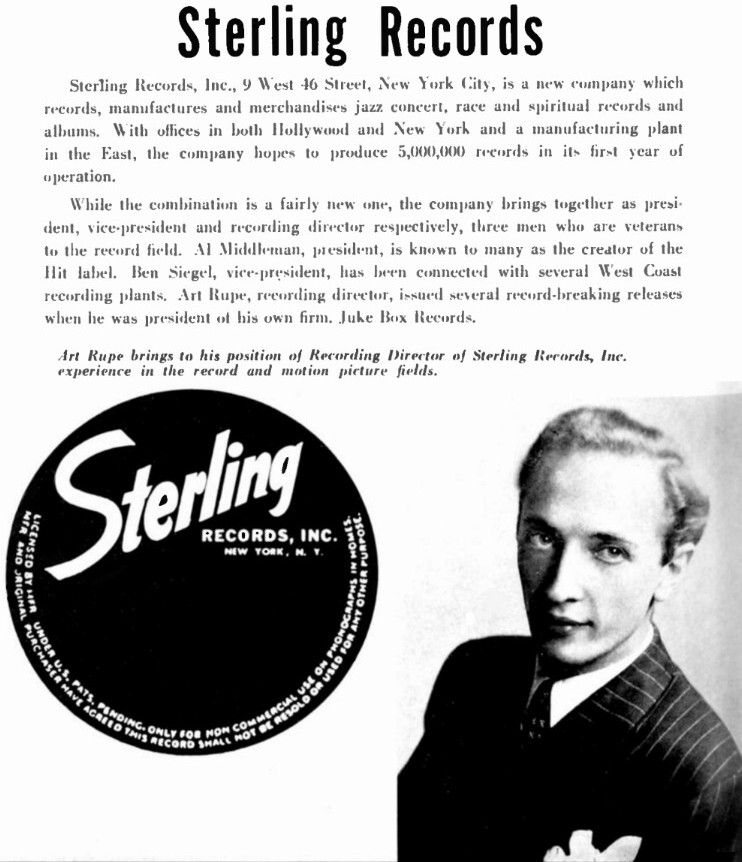
|
Above: From RECORD RETAILING YEARBOOK. As mentioned in Part One, when Art Rupe's Juke Box Records was bought out by Al Middleton, Rupe became co-partner of the new Sterling label. Juke Box continued to release records as a subsidiary label of Sterling Records. Rupe sold his interest to Middleman, keeping some of the Juke Box masters, which would be released on Rupe's next label, Specialty Records, as will be seen further down this page.
In addition to rhythm and blues, Sterling issued gospel and country & western records. Hank Williams' first four records were on the Sterling label.
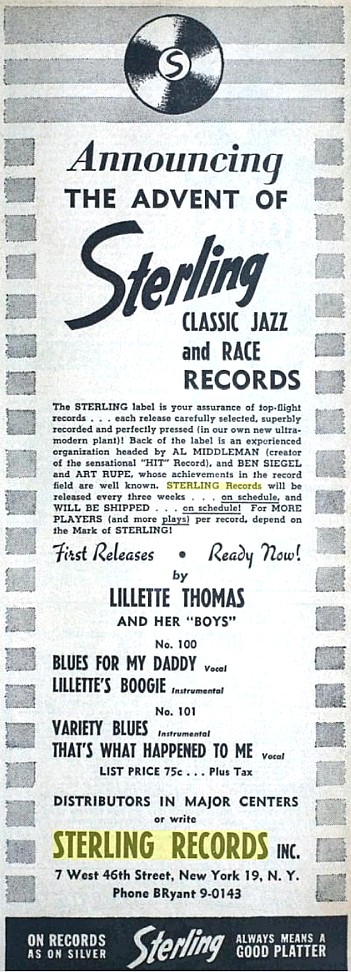
|
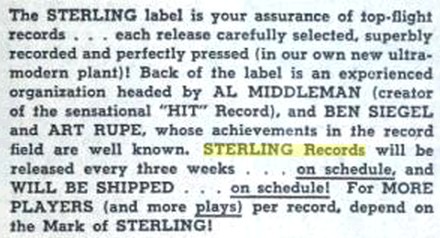
|
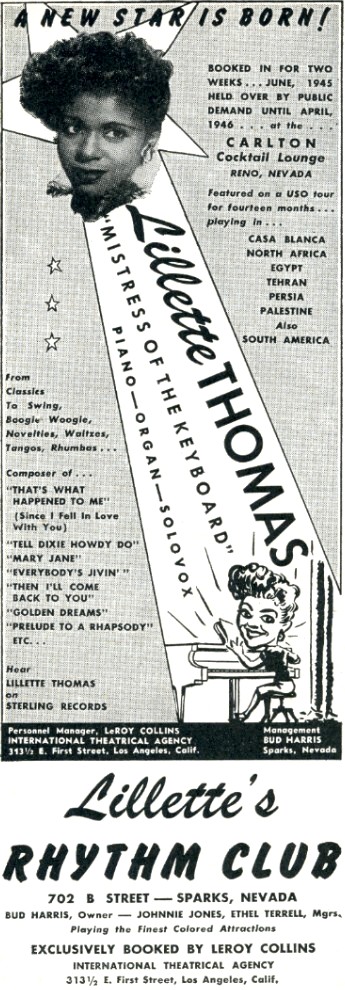
|
Above Left: THE BILLBOARD, October 20, 1945. Above Right: THE BILLBOARD 1945/1946 YEAR BOOK.
Per the "Queen Of The Keys" website, Lillette's Rhythm Club is "The first Black Nightclub-Casino-Hotel in Reno-Sparks, Nevada."
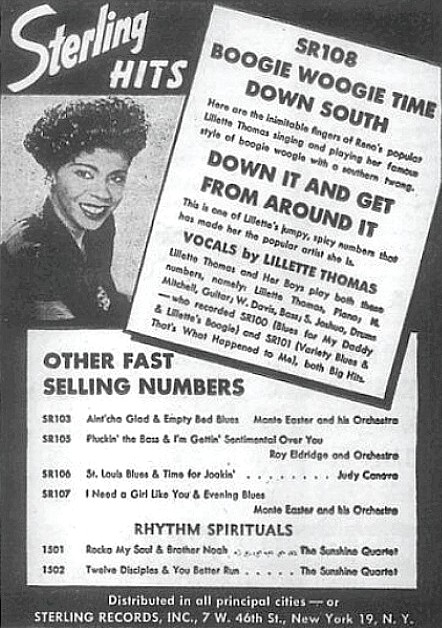
|
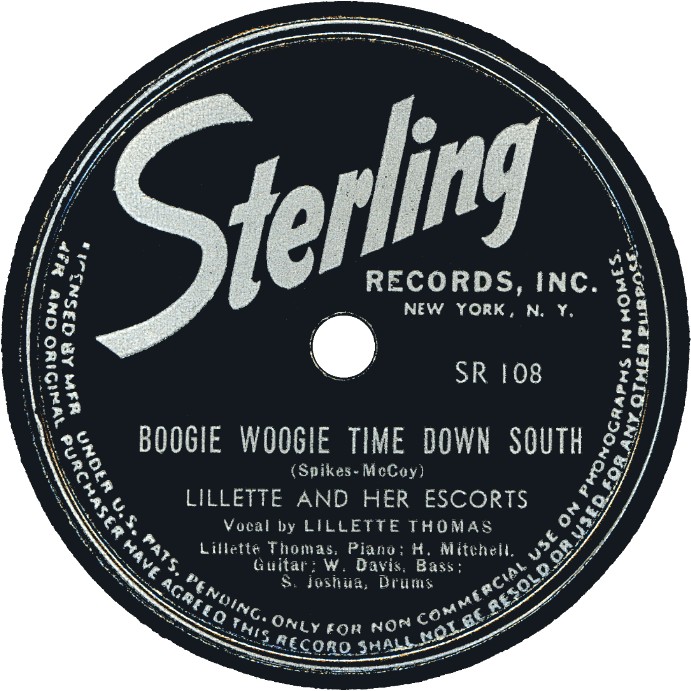
|
Above Left: 1946 Trade Magazine Clipping. Above Right: Label image for Sterling SR 108, released in 1946. Lillette is backed vocally by her Escorts on this side.
Lillette Thomas had four releases on the Sterling label (1945-46). The first two (SR100 & 101) are by Lillette Thomas And Her Boys, consisting of L. Thomas (piano), B. Harper (guitar), R. Hamilton (bass), T. "Max" Davis (tenor sax), and Eddie Harris (drums).
The final two (SR 108 & 109) are by Lillette And Her Escorts, consisting of L. Thomas (piano), H. Mitchell (guitar), W. Davis (bass), and S. Joshua (drums).
THE BILLBOARD, November 24, 1945: LILLETTE THOMAS NOW WITH STERLING
This new label introduces a new race artist to the records in Lillette Thomas, with plenty of jelly-roll appeal in her husky pipes as she shouts the blues and also spins as an expert keyboard knuckler. Backed by a small jam band that takes in tenor sax and the rhythm instruments, Miss Lillette sings in striking manner.... Race locations can count on a new record leader in the platterings of Lillette Thomas.THE BILLBOARD, January 11, 1947: LILLETTE AND HER ESCORTS
The husky blues shouting and barrelhouse piano pounding of Lillette Thomas, with the bass, drums and guitar making her Escorts, is right out of the back rooms at Harlem hotteries. Gal knuckles the keyboard as heavy as she does the wordage, with little regard to balance in favor of bounce, particularly with the guitar man picking his way in and out of notings.... Designed entirely for the Harlem hotteries where the raucousness of the rhythms make the phono play all the more inviting.
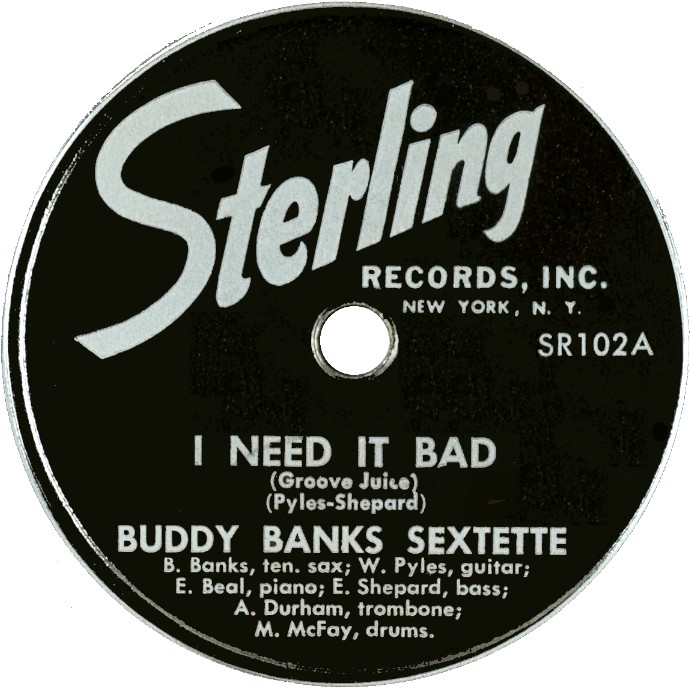
|
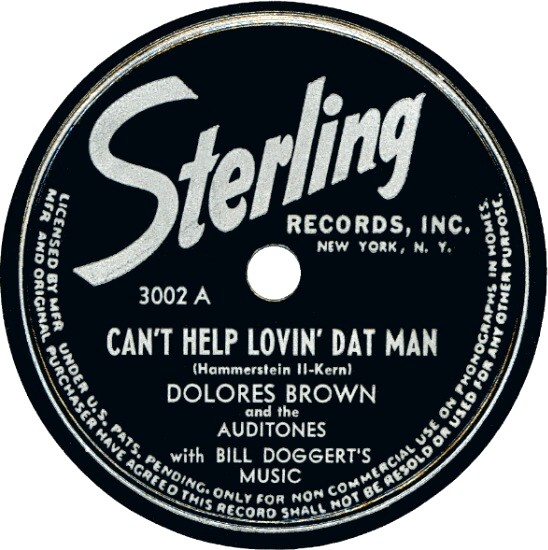
|
Above Left: Label image for Sterling SR102A, released in 1946. This side has ensemble singing. The flip-side, "Banks' Boogie", is an instrumental. Buddy Banks also recorded for Art Rupe's Juke Box and Specialty labels. There will be more about him on Specialty in Part Three of this article. Above Right: Label image for Sterling 3002 A, released in 1947. "Bill Doggert" on the labels is actually Bill Doggett. Doggett was pianist and arranger for The Ink Spots from 1942 to 1944. This is the second of two records on Sterling by Dolores Brown And The Auditones. The Auditones, without Dolores, also had two records on the Rainbow label.
Click HERE for an article about Dolores Brown by Marv Goldberg. (Will open in a separate window)
The Billboard Review (2/11/46):
BUDDY BANKS SEXTETTE — Sterling SR102.... I Need It Bad/Banks' Boogie
The first, "I Need It Bad", is a funny vocal with a novel rhythm that will draw plenty of notice. Itís a change from the ordinary style of such groups. The flipover, "Banks' Boogie", is another Boogie done in the Banks style.
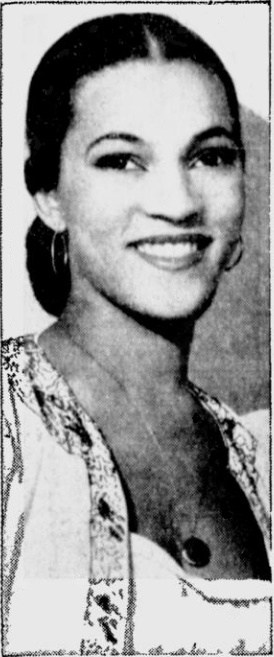
|
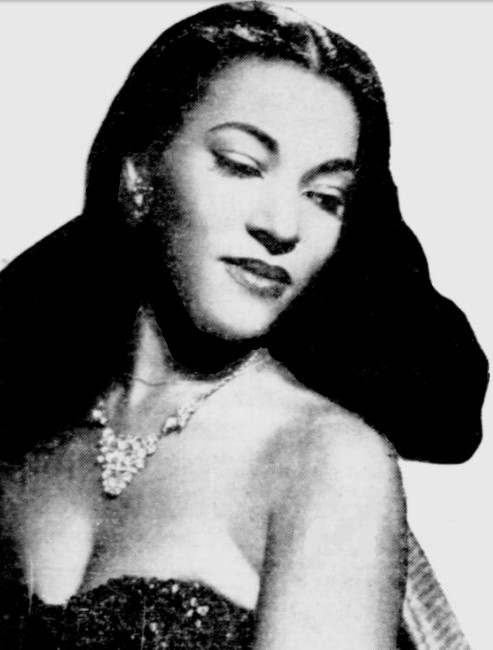
|
Above Left: SAN JOSE NEWS, August 16, 1940. Dolores Brown, with the Erskine Hawkins "world famous" Orchestra. Above Right: AFRO-AMERICAN, August 4, 1945. Dolores Brown, returns to Erskine Hawkins Orchestra "after a five-year absence, during which she performed in various clubs in New York and out of town".
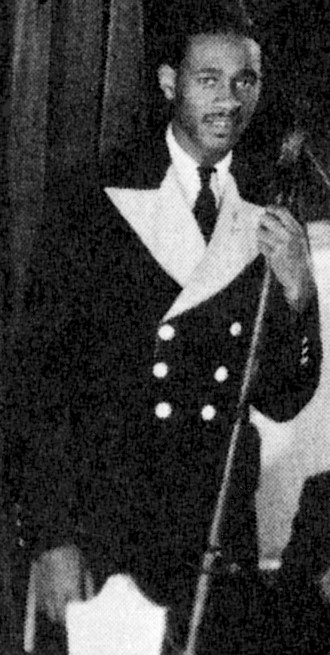
|
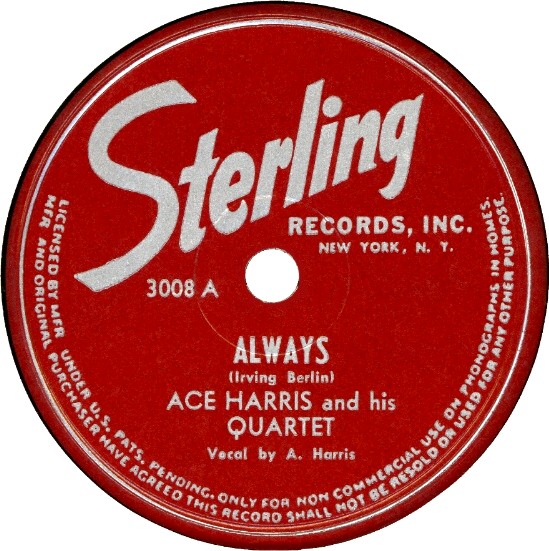
|
Above Left: Ace Harris, with the Original Sunset Royal Serenaders band, from West Palm Beach, Florida, in 1935. From 1940 to 1942, Ace was pianist and arranger for The Ink Spots. Above Right: Label image for Sterling 3008 A, released in January 1948. Ace Harris sings lead with vocal accompaniment from his combo. This is the first of three records that he had on the Sterling label.
PITTSBURGH COURIER, July 19, 1947: ACE HARRIS FORMS COMBO
Ace Harris, former headliner with the Erskine Hawkins band as pianist-singer-arranger, has formed his own combination. A small aggregation, it will put heavy emphasis on sweet music, novelties, and original pop creations. The instrumentation of the new group will be piano, bass, singing guitar, and vibes.Harris, who has won national attention in the popular music field as the result of his work on a number of hit records such as "After Hours," "Remember," "Caldonia," and "Shorty's Got To Go," decided to form his own combination only after many of his friends and admirers had insisted that he should no longer hide his exceptional talents under a musical bushel.
In addition to Harris, who naturally will be featured both as singer and pianist, the group will include Pete Diggs, dynamic young vibraharpist; Wilbur (Sleepy) Chaplain, and a surprise bassist, whom Harris will reveal when the combo bows into a local nightery early next month.
PITTSBURGH COURIER, October 11, 1947: ACE HARRIS SIGNS
Ace Harris, the genial piano playing maestro, was signed last week to a recording contract with Sterling Records.LISTEN (Windows Media Player): [Audio restoration by Dave Saviet.]
1. "Boogie Woogie Time Down South" - Lillette And Her Escorts (Vocal By Lillette Thomas And Ensemble) - Sterling SR 108 - 1946.
2. "I Need It Bad" - Buddy Banks Sextette (Vocal By Ensemble) - Sterling SR102A - 1946.
3. "Can't Help Lovin' Dat Man" - Dolores Brown And The Auditones - Sterling 3002 A - 1947.
4. "Always" - Ace Harris (Vocal By Ace Harris And Ensemble) - Sterling 3008 A - 1947.ALL FOUR SONGS played in sequence.
EARLY SPECIALTY LABEL: Art Rupe started his Specialty Records in 1946.
The first Specialty releases were re-issues of Juke Box Records' sides. As noted near the top of this page, Art Rupe retained ownership of some of that label's most popular songs (some of those are featured in Part One as Juke Box Records). Following are two example Specialty records that re-used Juke Box sides. The audio for these, while already included in Part One, are repeated here for convenience.
Also, in Specialty's early days, Rupe re-recorded some of the songs that had been issued on the Roy Milton and Miltone labels.
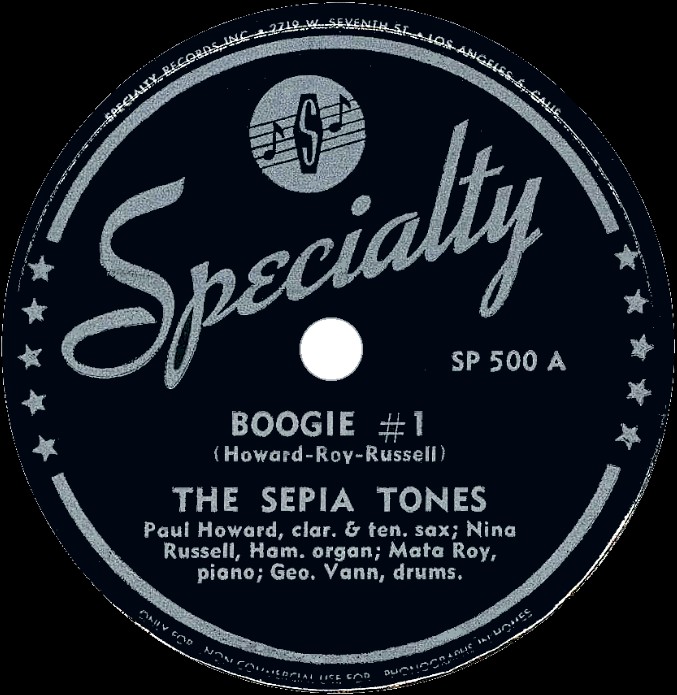
|
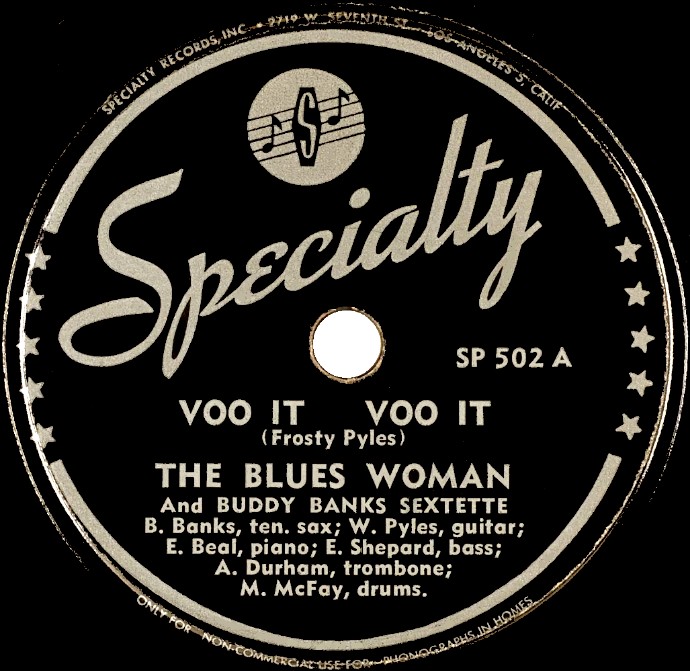
|
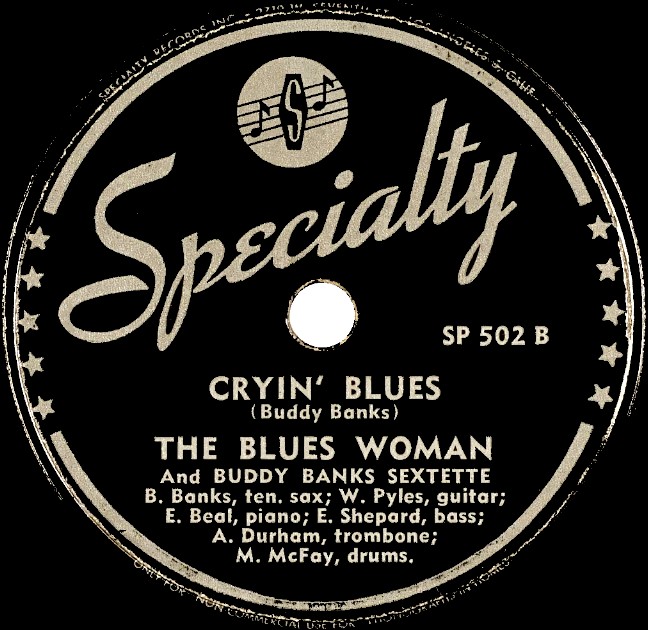
|
Above Left: Label image for Specialty SP 500 A, released in 1946. This was first issued as Juke Box UR-100-A in 1944.
Both sides are instrumentals. [NOTE: This record provided by Dave Saviet for use here.]Above Middle And Right: Label images for Specialty SP 502 A/B, released in 1946. This was first issued as Juke Box JB502A/B in 1945. "The Blues Woman", Marion Abernathy, is the singer on both sides.
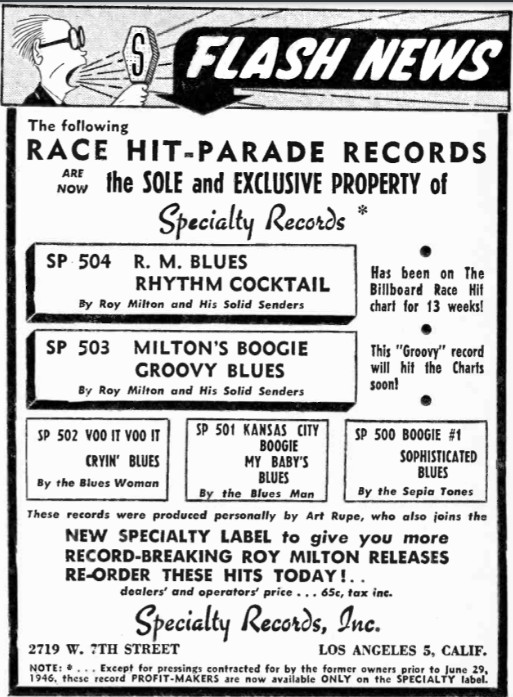
|
Above: THE BILLBOARD, August 10, 1946.
All of the listed records in the above clipping had been previously released on the Juke Box label. As indicated in the clipping, Art Rupe planned on recording Roy Milton extensively. This did happen and resulted in both Art and Roy's great benefit.LISTEN (Windows Media Player): [Audio restoration by Dave Saviet.]
1. "Boogie #1" - The Sepia Tones (Instrumental) - Specialty SP 500 A - 1946.
2. "Voo It Voo It" - The Blues Woman And Buddy Banks Sextette - Specialty SP 502-A - 1946.
3. "Cryin' Blues" - The Blues Woman And Buddy Banks Sextette - Specialty SP 502-B - 1946.ALL THREE SONGS played in sequence.
SPECIALTY RECORDS - ROY MILTON AND HIS SOLID SENDERS: Without any doubt, it was Roy Milton And His Solid Senders, including Camille Howard, that put Specialty Records on the map! They provided the label with a steady stream of hits in the first several years of Specialty's existence. Roy And His Solid Senders recorded for Specialty from 1947 to 1955.
TRADE MAGAZINE, February 1950: ROY MILTON'S SUCCESS STORY
HOLLYWOOD—It's a funny thing about fame, as Roy Milton well knows. Just as soon as you're ready to give up the chase, suddenly you wake up and find yourself a genuine "celebrity". "For years, I worked and worked towards this goal", Milton said in a recent interview. "Folks who heard my music liked it. But there was no startling reaction to my band and its style. And then it happened".Drummer man Milton has been playing the same type of blues since he first sat down at a set of tubs many years ago, when he vocalized with the Ernie Fields Orchestra. One night the band's regular drummer failed to show for an engagement, and Fields asked Milton to sit-in and fill the gap. He has been beating the drums ever since.
In 1938 Roy decided to try his luck in the West. Shortly after his arrival in California, he formed his own band. Roy stated further: "I guess I was lucky. I did manage to keep my band working". People who heard the band liked it, but it wasn't until 1945, that Art Rupe, president of Specialty Records, first heard the band. Rupe liked it so well, he asked Roy to make a test audition. A long-term contract was the result.
With his first recording of "R.M. Blues", Dame Fortune smiled upon the young bandleader and opened her doors to success. Other releases followed, with each establishing Roy more and more solidly with the music-loving public.
Roy returned to his hometown of Tulsa, Okla., in 1947. "That was the most thrilling moment of my life", stated Roy. "There was a gala parade in my honor, and I was given the key to the city".
Roy is a very down-to-earth guy who once had ambitions of joining the ministry. His plaintive type of blues delivery reflects the deep understanding of the suffering of his people.
Like all bands, Roy's has had its personnel changes thru the years, but his blues styling has remained the same. His Specialty recordings continue to find him at the top of the nation's performing bandleaders.
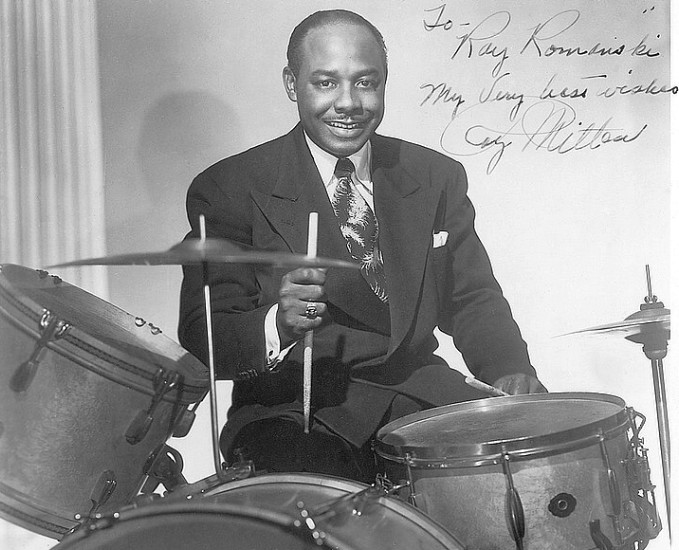
|
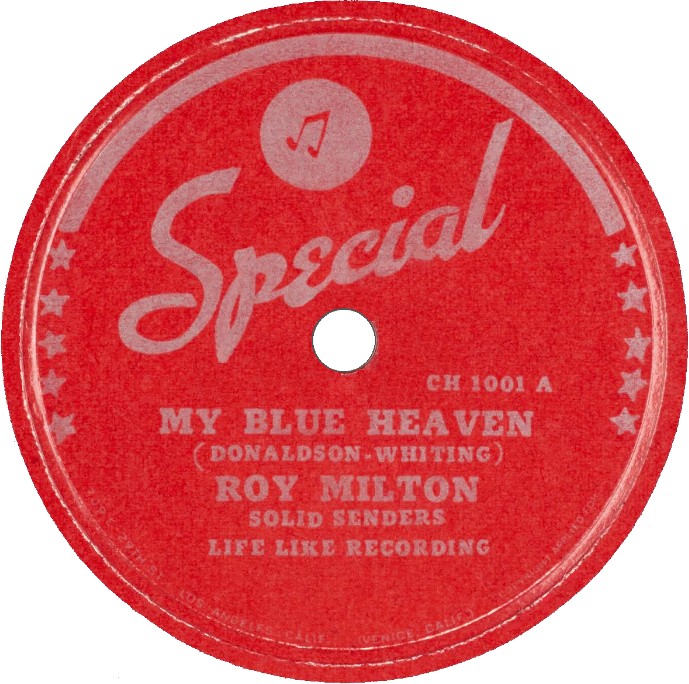
|
Above: Label image for Special CH 1001 A. Roy Milton is backed vocally and instrumentally by his Solid Senders. The flip-side, "Run Roy Run", is an instrumental. Wonder what the "CH" stands for... could it possibly somehow be Camille Howard? "My Blue Heaven" by Roy Milton And His Solid Senders was released on Specialty SP 522 B in early 1948 as the flip of "Keep A Dollar In Your Pocket". The Online Discographical Project has a December 31, 1947 recording date for that. The Special and Specialty versions sound very similar, except for the chatter in the background on the "Special" version. Did not find any release for "Run Roy Run" on the Specialty label.
This record is somewhat an enigma. The label is "Special", NOT "Specialty". On the "A" side, there is "PW-1001-A" stamped in the dead wax. The "B" side has "VR-212-AA" in the dead wax.
Was this the only record released under this name? Was it the December 31, 1947 recording overdubbed? When was it released? If anyone has any information about the record or use of the name "Special", please contact the webmaster of this website.
Perhaps this "Special" record is a bootleg copy. See the following article (edited for brevity).
CALIFORNIA EAGLE, January 29, 1948: WAR PERKINS WINS SUIT OVER MILTON
A suit filed by Roy Milton and orchestra sought to enjoin and prevent War Perkins and William O. Reed, doing business as Day Distributing Company, from distributing and selling records "My Blue Heaven", "Jumping At The Woodside", and "One O'Clock Jump" as recorded by Roy Milton. Milton had contended that War Perkins was selling and distributing those musical numbers without permission or authorization and without Milton's knowledge.Perkins' defense was that the distribution and selling of those records was in pursuance of a valid personal agreement between Milton and Perkins. Superior Judge Hason, presiding, upheld Perkins' argument in denying Milton's suit and ruled that the agreement between the parties was upon its face, valid....
LISTEN (Windows Media Player): [Audio restoration by Dave Saviet.]
1. "My Blue Heaven" - Roy Milton Solid Senders (Vocal By Roy Milton And His Solid Senders) - Special CH 1001 A.
2. "Run Roy Run" - Roy Milton Solid Senders (Instrumental) - Special CH 1001 B.BOTH SONGS played in sequence.
For comparison purposes, here is audio of the Specialty version of "My Blue Heaven":
"My Blue Heaven" - Roy Milton And His Solid Senders (Vocal By Roy Milton And His Solid Senders) - Specialty SP 522 B - 1948.CASH BOX, February 14, 1948:
....Specialty Records prexy Art Rupe reports orders are pouring in from all over the country for Roy Miltonís latest Specialty release, "My Blue Heaven".... In first L. A. appearance last week, Miltonís crew took the town by storm with a block long line around the Central Ave. Elkís Club.
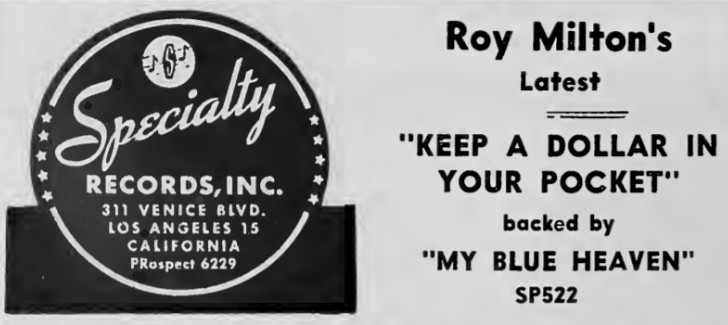
|
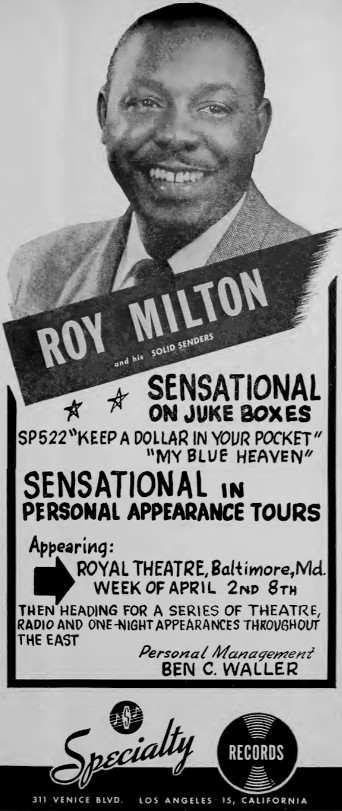
|
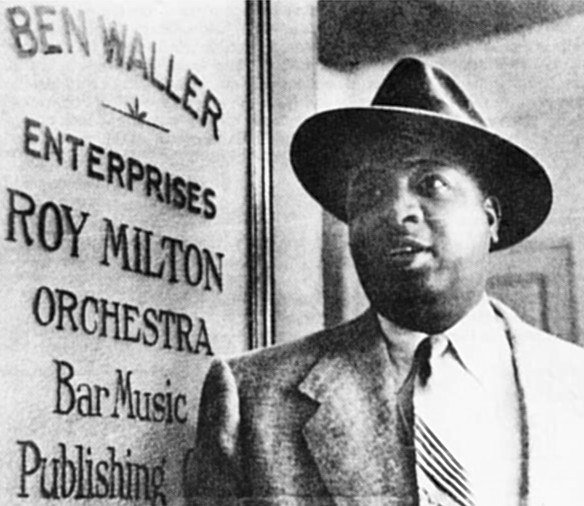
|
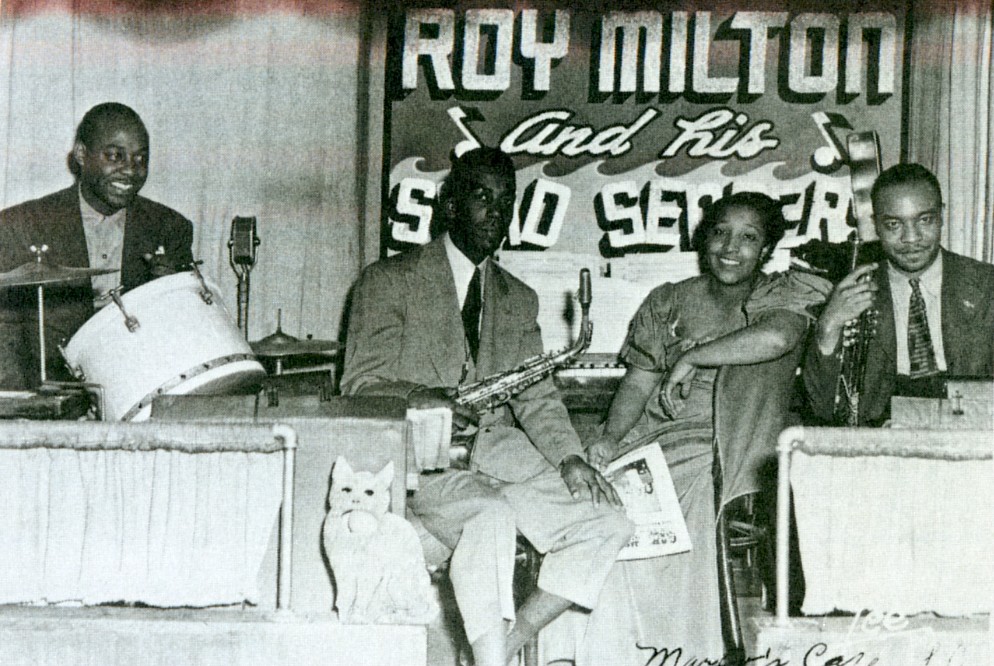
|
Above: Roy Milton And His Solid Senders, from the early 1940s. "Tulsa drummer and dancer Roy Milton made $2 a night singing on Central Avenue until the war brought him big audiences at Marco's Café". In photo (L-R) Roy Milton (drums), Luke Jones (alto-sax), Betty Hall Jones (piano), and Forrest Powell (trumpet).
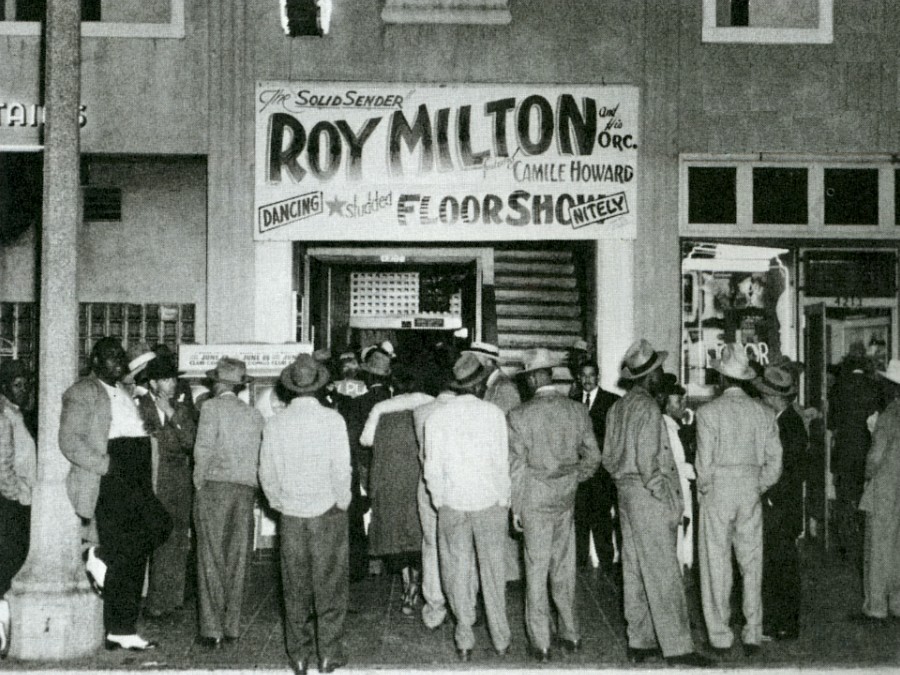
|
Above: Outside Club Alabam on Central Avenue, Los Angeles, where Roy Milton and Camille Howard were performing in the late 1940s.
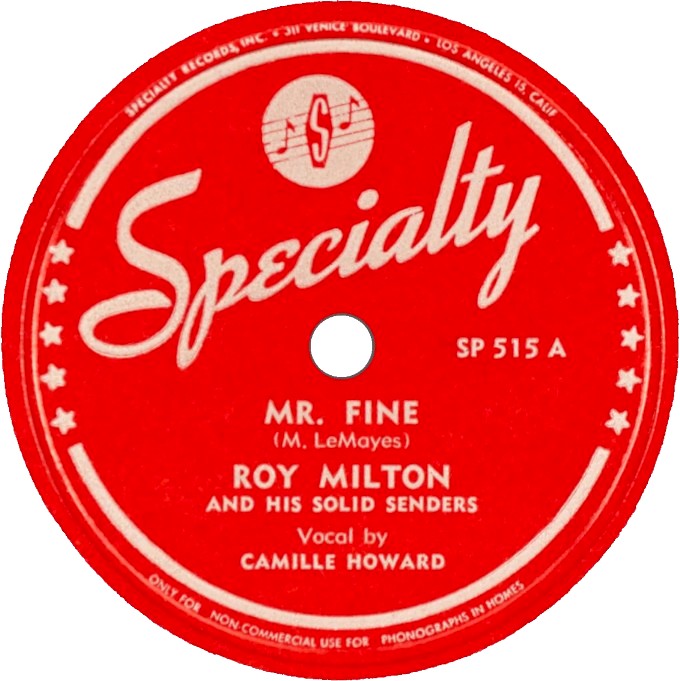
|
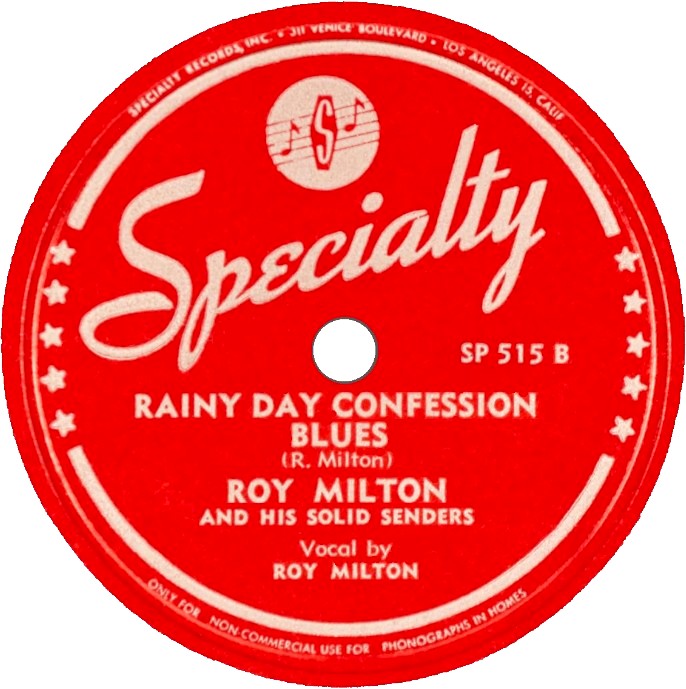
|
Above: Label images for both sides of Specialty SP 515 A/B, recorded on March 8, 1947 and released in April 1947. A different version of "Rainy Day Confession Blues" by Roy Milton had been issued on Roy Milton 1-10A in 1946 (That version is included in Part One). And a different version of "Mr. Fine" had been released on Roy Milton 103 in 1946.
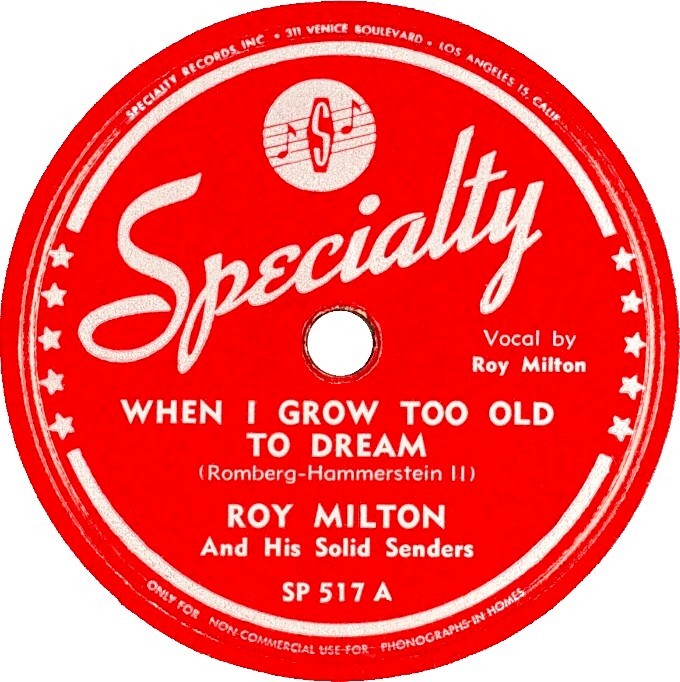
|
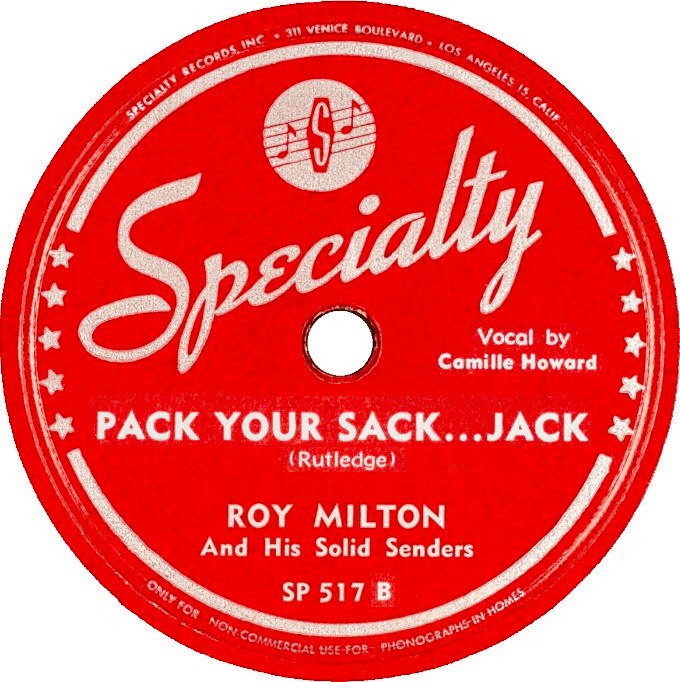
|
Above: Label images for both sides of Specialty SP 517 A/B, recorded on March 8, 1947 and released in 1947. A different version of "When I Grow Too Old To Dream" was issued on Miltone 202 (That version is included in Part One). Also, a different version of "Pack Your Sack...Jack" was issued on Miltone 219. CASH BOX, September 29, 1947: THIS AGE OF SPEED
CHICAGO—Keeping in mind that this is the age of speed, Specialty Record prexy, Art Rupe hopped off to Chicago this past week to cut his current hot item, Roy Milton. Milton, whose discs are hotter than a ten dollar pistol is in the Windy City guesting at the formation of a fan club organized in his honor.Rupe cut four sides and immediately rushed them to the coast for pressings. Word now has it that Miltonís disks are going so strong, ops have to buy via "le marche noir" [the black market].
CASH BOX, October 27, 1947: SPECIALTY PLATTERS CLICK WITH MUSIC OPS
HOLLYWOOD—Specialty Records, this city, announced to the trade this past week, that they have reached peak sales figures with recordings by Roy Milton.... Art Rupe, prexy of the Specialty plattery, disclosed that Milton's records are featured in practically every city in the nation.In a statement concerning the rise and popularity of the Specialty label, Mr. Rupe said, "We owe a vote of thanks to every music operator [juke box operator] in the nation for featuring our records in their machines. There is no doubt in my mind, that they, the music operators have been instrumental in creating the wide demand for Milton...."
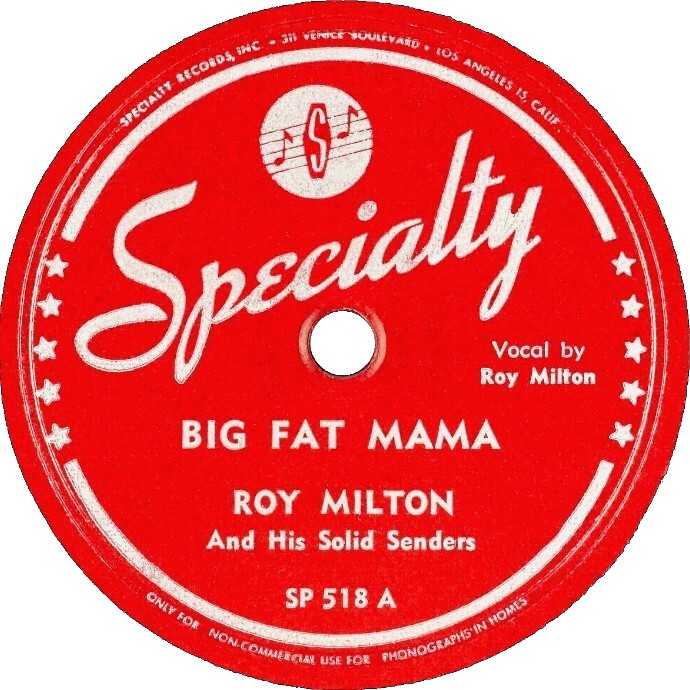
|
Above: Label image for Specialty SP 518 A, recorded on August 1, 1947 and released in 1947. The Cash Box Review (9/8/47):
ROY MILTON ORCH. — Specialty 518.... Big Fat Mama
Royal crew of jazz hounds clicking from coast to coast with every hunk of wax they turn out, have the makings of more hit material with "Big Fat Momma". The merry Roy Milton ork offer the ditty in rip tempo with maestro Roy coming in to wail the familiar wordage.The ditty, a coin culler when offered several years back, looks to repeat and with the adage being that good music never dies; this cookie holds the line throughout. The side is aimed at race spots, and ops needing moola music should by all means grab this one.
CALIFORNIA EAGLE, September 18, 1947: ROY MILTON IN RECORD BREAKER
Roy Milton broke another record this month, but not the wax variety. The personable band leader drew 4,000 paid admissions in Atlanta, Ga., with his recent engagement thus breaking all existing box office records at the spot. Milton took home one-half of the $6,000 gross as his share for a good night's work.....Roy and his remarkable six-piece outfit are booked for a tour of the Carolinas and Florida, beginning Oct. 31. From there Milton is slated to play music right across the country and wind up in San Francisco for a bang-up opening at Blackshear's on Jan. 2.
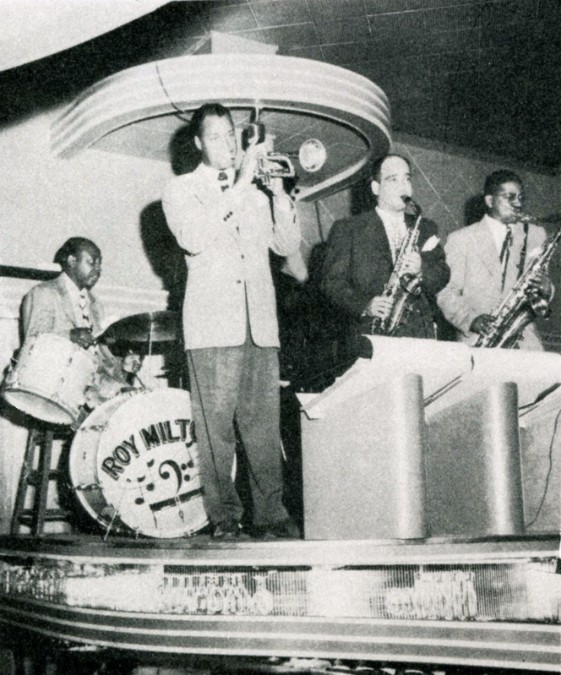
|
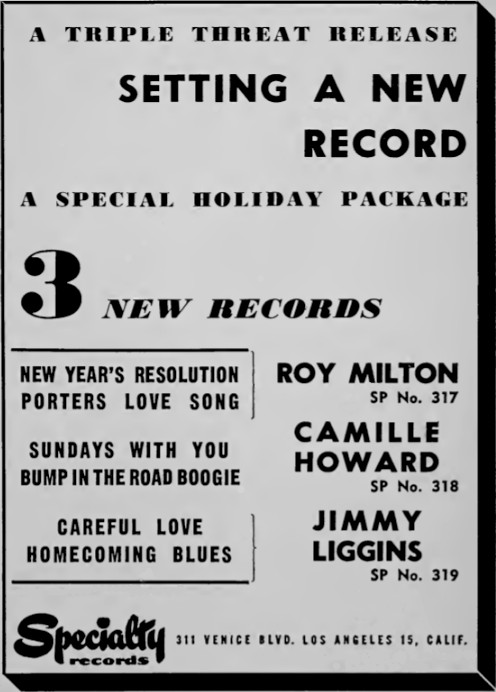
|
Above Left: Photo of Roy Milton And His Solid Senders performing. Above Right: CASH BOX, December 11, 1948. Notice the "new" design of the "Specialty" name.
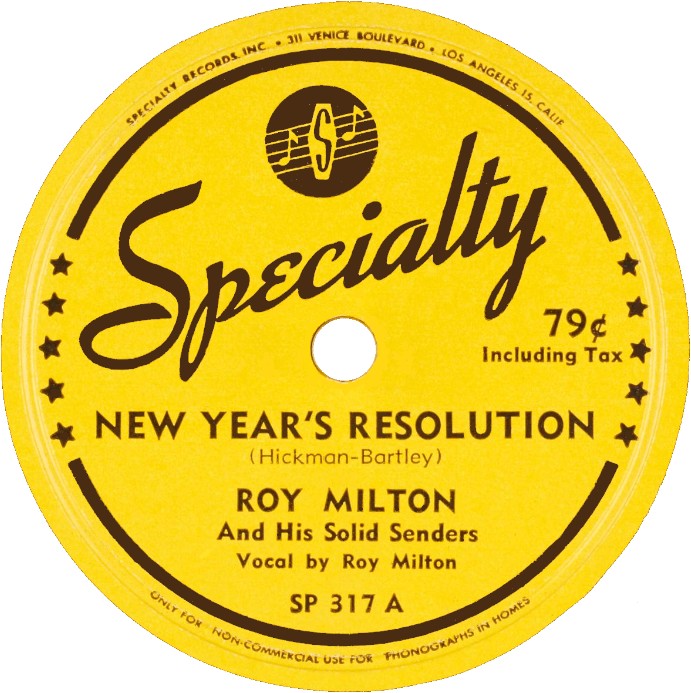
|
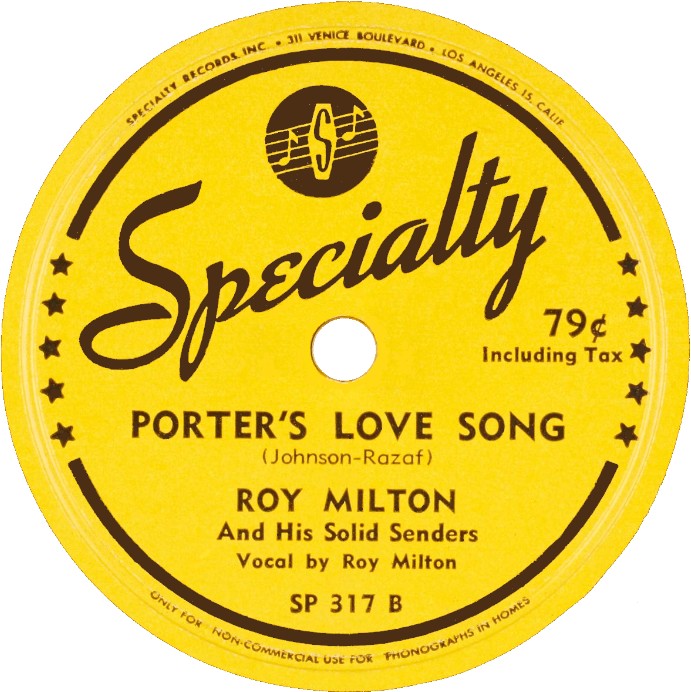
|
Above: Label images for both sides of Specialty SP 317 A/B, recorded on December 30, 1947 and released in 1948. CASH BOX, October 6, 1947:
....Public relations man Steve Earle of Specialty tells us that their number one boy Roy Milton waxed a number of fine platters while in Chicago, and for fast service, theyíre being pressed right now....CASH BOX, October 13, 1947:
....At Specialty Records, Steve Earle, number one man in the ad department, is planning a trip around the country to discuss new ideas as regards advertising with Specialty Distributors.... Their star platter maker, Roy Milton is still breaking box office records wherever he plays....CASH BOX, November 8, 1947: MILTON CANCELS TOUR
HOLLYWOOD—Roy Milton and his orchestra are cutting short their national tour for the purpose of recording more material for Specialty Records, it was learned late this past week. With the Petrillo ban looming overhead, Milton and Art Rupe, president of Specialty have decided that it is of utmost importance to get as many waxings of those popular Milton tunes as possible before the ban goes into effect.Milton disclosed that cancellation of his tour would mean giving up more than $15,000 in bookings in New York, Washington, D. C. and Baltimore.
CALIFORNIA EAGLE, December 9, 1948: SPECIALTY HAS 3 NEW DISCS
Specialty Records released three new records December 6th, by Roy Milton, Camille Howard, and Jimmy Liggins. The new Specialty releases by their "Big Three" promises to top their previous successes in record sales.Roy Milton's rendition of an original tune entitled "New Year's Resolution" imparts some advice for the New Year. It's backing, "Porter's Love Song", an old standard, makes it a difficult task in picking the "A" side.
The Cash Box Review (12/25/48):
ROY MILTON — Specialty 317.... New Year's Resolution/Porter's Love Song
The great Roy Milton on deck with a pair that are a cinch to score like a spade flush for a ton of jitney [nickels]. Both tunes have that familiar Roy Milton style attached to them that has met with such wide approval.Top deck, already kicking up a storm in the boxes has Roy spouting his "New Yearís Resolution". Itís great stuff with some mellow blues beat in it. Drive of Royís pipes adds to the polish of the platter immensely. On the flip with "Porterís Love Song", Roy bounces back again with another potential winner in this boogie beat.
Get with "New Yearís Resolution" — It will go like wildfire.
LISTEN (Windows Media Player): [Audio restoration by Dave Saviet.]
1. "Mr. Fine" - Roy Milton And His Solid Senders (Vocal By Camille Howard) - Specialty 515 A - 1947.
2. "Rainy Day Confession Blues" - Roy Milton And His Solid Senders (Vocal By Camille Howard) - Specialty 515 B - 1947.
3. "When I Grow Too Old To Dream" - Roy Milton And His Solid Senders (Vocal By Roy Milton And Ensemble) - Specialty 517 A - 1947.
4. "Pack Your Sack Jack" - Roy Milton And His Solid Senders (Vocal By Camille Howard) - Specialty SP 517 B - 1947.
5. "Big Fat Mama" Roy Milton And His Solid Senders (Vocal By Roy Milton And Ensemble) - Specialty SP 518 A - 1947.
6. "New Year's Resolution" - Roy Milton And His Solid Senders - Specialty SP 317 A - 1948.
7. "Porter's Love Song" - Roy Milton And His Solid Senders - Specialty SP 317 B - 1948.ALL SEVEN SONGS played in sequence.
ENCORE - ROY MILTON PRE-SPECIALTY:
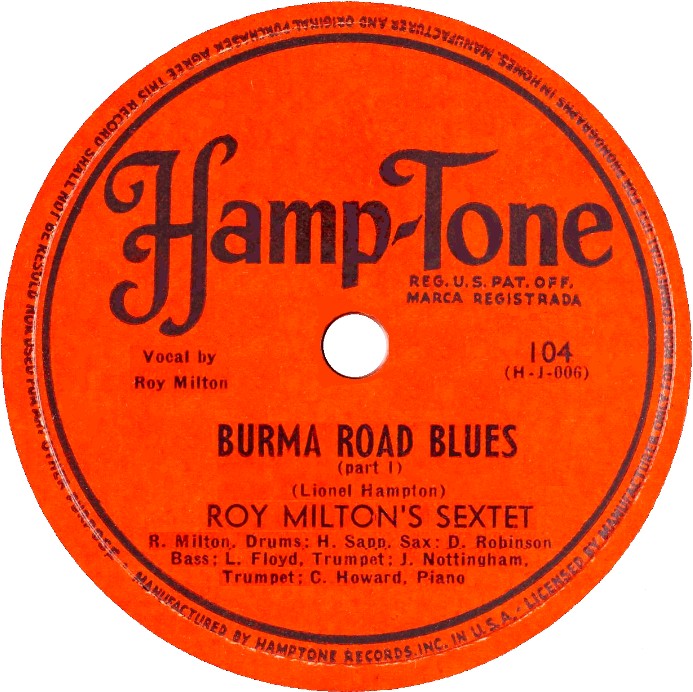
|
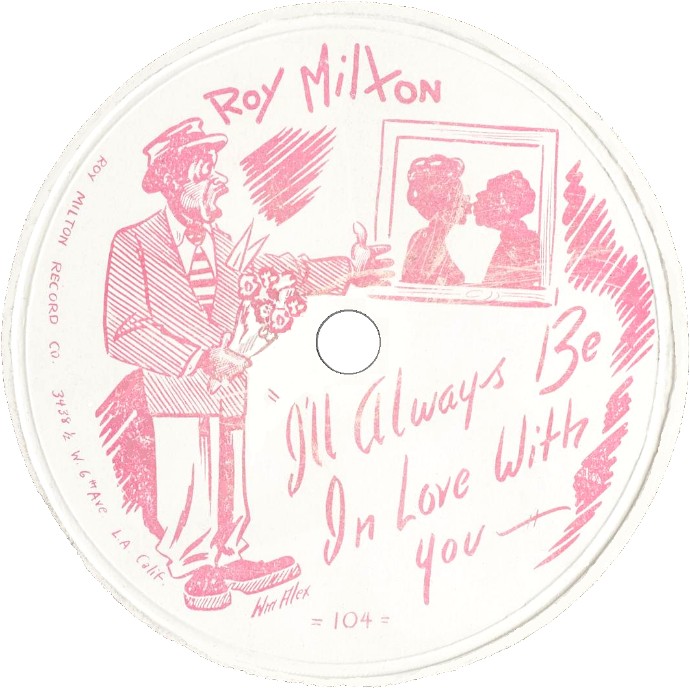
|
Above Left: Label image for Hamp-Tone 104, released in 1946. This label is "part 1".... the same label is on the flip-side, except for showing "part 2". Notice that Camille Howard is credited as the piano player. This song was composed by Lionel Hampton and is on a label owned by him. Above Right: Label image for Roy Milton 104, released in 1946. The song, "I'll Always Be In Love With You", was re-recorded and released on Specialty SP 513 in 1947. The label image for the flip-side, "Sunny Side Of The Street", is at far right. That song was re-done as the flip-side of Specialty SP 513.
Cash Box Review (12/9/46):
ROY MILTON ORCHESTRA — Miltone 104....
Sunny Side Of The Street/I'll Always Be In Love With You
Hereís an oldie thatís been kicked around a lot, but nevertheless a mainstay. Roy Miltonís boys give the tune plenty of accent on a blue sax, and the way it comes out is really nice. With vocal chorus in the middle, they should go for it if they like "Sunny Side" again. Flipped is, "Iíll Always Be In Love With You", with Milton handling the vocal chores again. Both sides are "race" stuff and ops who can stand some more, might do well to listen.LISTEN (Windows Media Player): [Audio restoration by Dave Saviet.]
1. "Burma Road Blues (Part 1)" - Roy Milton's Sextet - Hamp-Tone 104 - 1946.
2. "Burma Road Blues (Part 2)" - Roy Milton's Sextet - Hamp-Tone 104 - 1946.
3. "I'll Always Be In Love With You" - Roy Milton (And His Band) - Roy Milton 104 - 1946.
4. "Sunny Side Of The Street" - Roy Milton (And His Band) - Roy Milton 104 - 1946.ALL FOUR SONGS played in sequence.
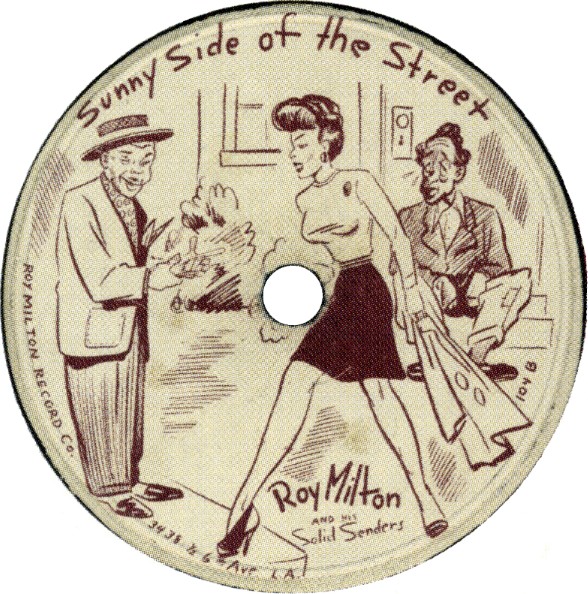
SIDEBAR — "WHEN I GROW TOO OLD TO DREAM": The song was composed by Sigmund Romberg (music) and Oscar Hammerstein II (lyrics). It was published in 1934 and first released on record in 1935 by several artists, including The Boswell Sisters and Glen Gray And The Casa Loma Orchestra. The song was recorded many times by many artists over the years. Roy Milton's recording of it is in the above section of this page. Compare his to the following versions.
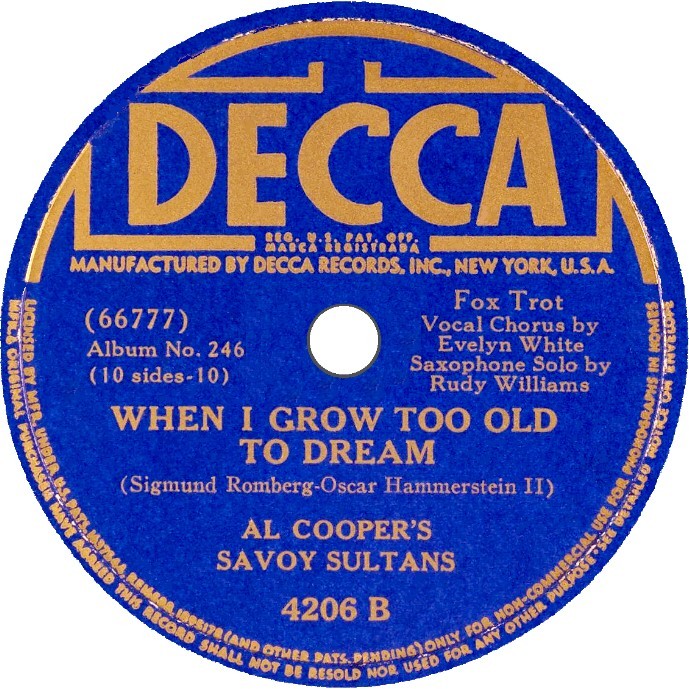
|
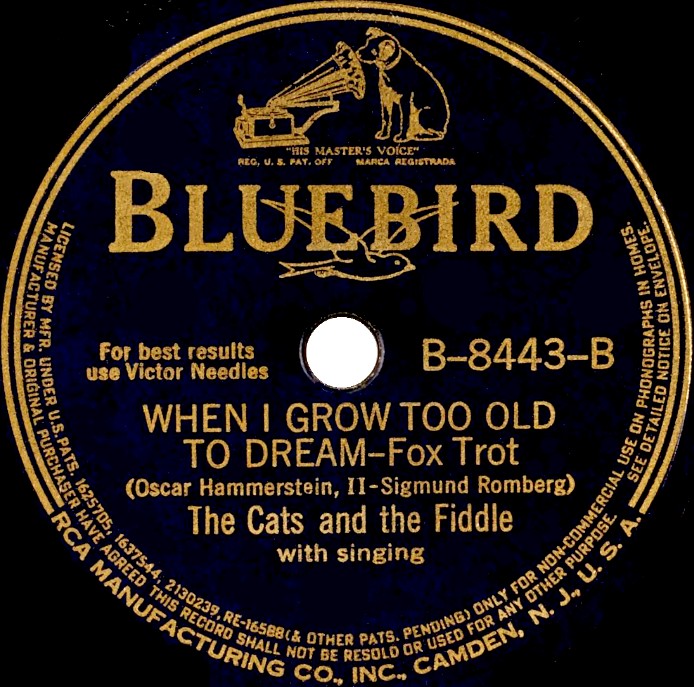
|
Click HERE for an article about The Cats And The Fiddle by Marv Goldberg. (Will open in a separate window)
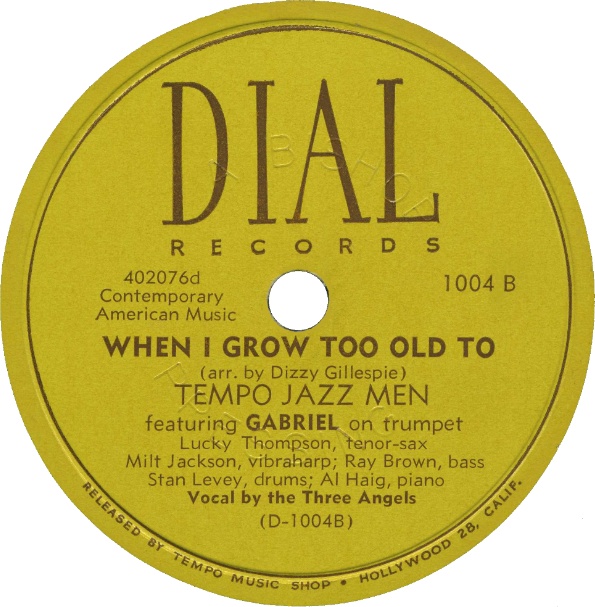
|
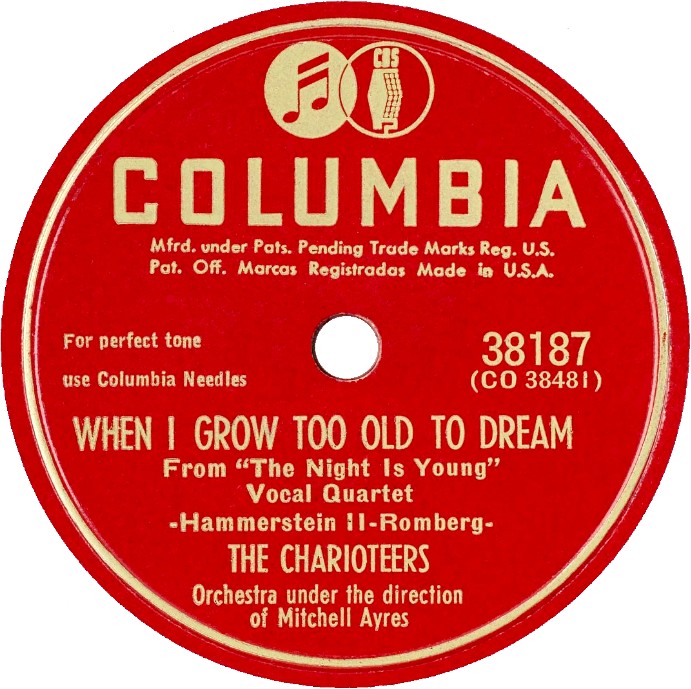
|
Dizzy Gillespie is the "GABRIEL" credited on the Dial label. The "Three Angels" are Gillespie, Lucky Thompson, and Milt Jackson. Was the "DREAM" at the end of the song title omitted for lack of room? [NOTE: This Dial record provided by Dave Saviet for use here.]
LISTEN (Windows Media Player): [Audio restoration by Dave Saviet.]
1. "When I Grow Too Old To Dream" - Al Cooper's Savoy Sultans (Vocal By Evelyn White) - Decca 4206 B - 1939.
2. "When I Grow Too Old To Dream" - The Cats And The Fiddle - Bluebird B-8443-B - 1939.
3. "When I Grow Too Old To Dream" The Tempo Jazz Men (Vocal By The Three Angels) - Dial D-1004B - 1946.
4. "When I Grow Too Old To Dream" - The Charioteers - Columbia 38187 - 1947.ALL FOUR SONGS played in sequence.
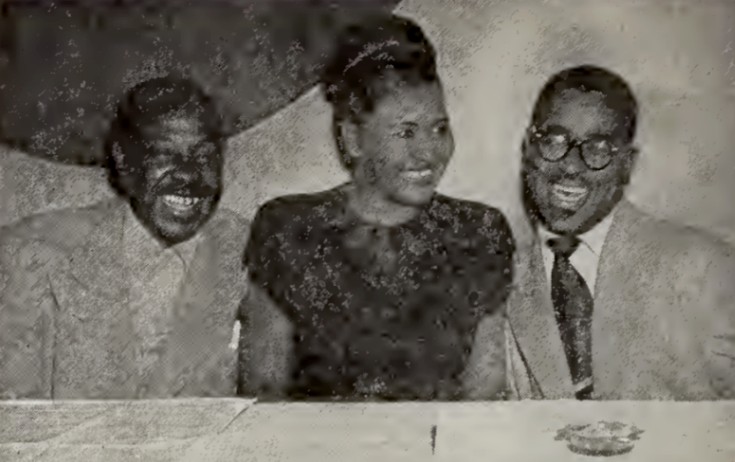
|
Above: CASH BOX, December 25, 1948.
NEW YORK—Caught during a moment of relaxation, three of the nation's foremost recording stars are pictured during an evening at New York's famed Metropolitan Bopera House, the Royal Roost.Pictured above, left to right: Roy Milton and singer Camille Howard, Specialty Records artists; and Dizzy Gillespie, who waxes for the RCA Victor banner. Juke Box ops acclaimed the trio in the recent Cash Box music poll.
MORE EARLY SPECIALTY RECORDS:
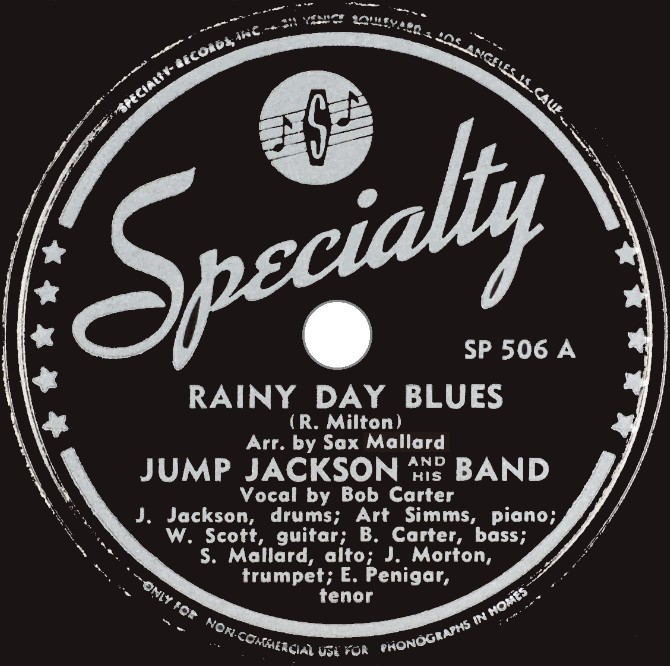
|
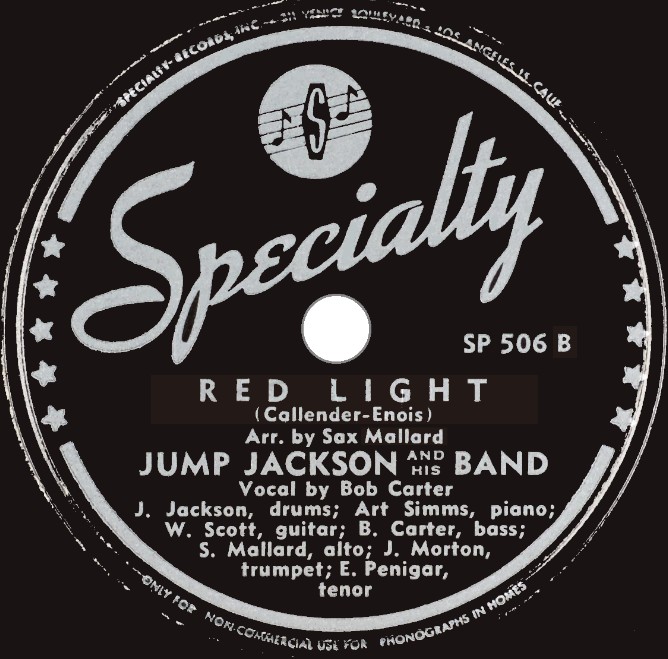
|
Above: Label images for both sides of Specialty SP 506 A/B, recorded on October 4, 1946 and released in 1946. On "Rainy Day Blues", Bob Carter does the vocal. This is the same song that Roy Milton And His Band recorded on Milton 1-10 A, as "Rainey Day Confession Blues", released earlier in 1946 (included in Part One). And the same song as "Rainy Day Confession Blues" that Roy Milton re-recorded for Specialty SP 515 B in 1947 (included further above). On "Red Light", Bob Carter, the bass fiddle player, sings lead with vocal backing by the band. Jump Jackson's band was involved in four records on the Specialty label, all in 1946. "Red Light" had been released by Roy Milton on his Roy Milton label 102 in 1946 (also included in Part One).
Sax Mallard, arranger of these two songs, was a member of Jump Jackson's band.
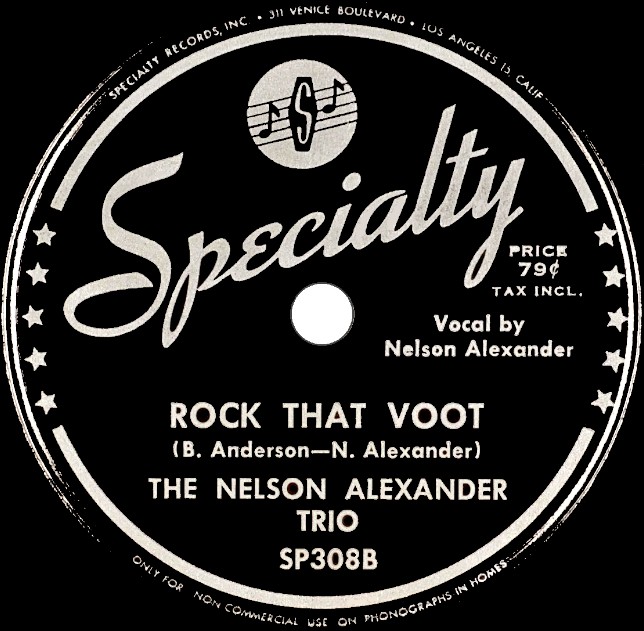
|
Above: Label image for Specialty SP308B, recorded on December 31, 1947 and released in 1948. Vocal is by Nelson Alexander with ensemble vocal backing. Alexander was a vocalist and pianist. This is the trio's only record for the Specialty label. CASH BOX, January 17, 1948:
Prexy Art Rupe of Specialty records, whoís been keeping things under his bonnet for the past few weeks, gives out with the following. Some weeks prior to the ban, Rupe signed and recorded a guitar, piano and bass combo known as the Nelson Alexander Trio.... I listened to one of the discs, and from the standpoint of juke box hits, this Trio seems destined to make lots of the silver coin for you ops.... watch for them....CASH BOX, May 15, 1948:
Art Rupe reports his artists all on road at present and ribs that Roy Milton, Jimmy Liggins, Nelson Alexander Trio, and The Pilgrim Travelers keeping "Pappy" broke by calling him collect from all over country, telling him how fine theyíre doing....
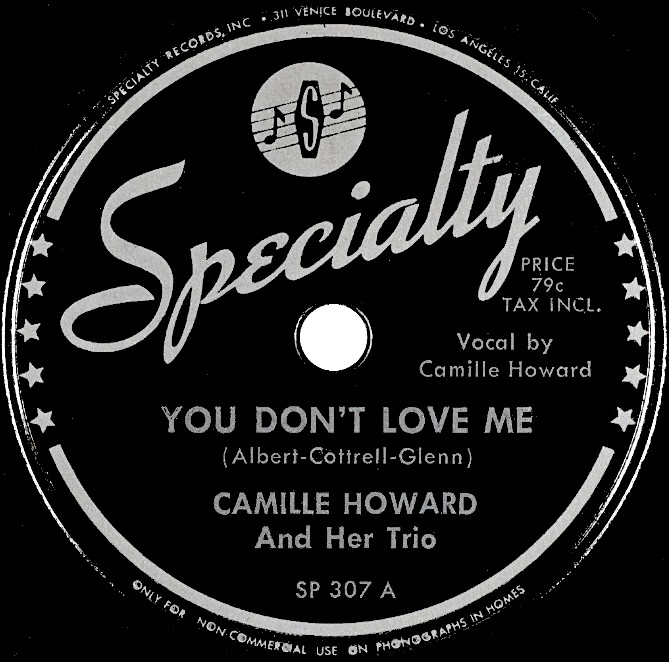
|
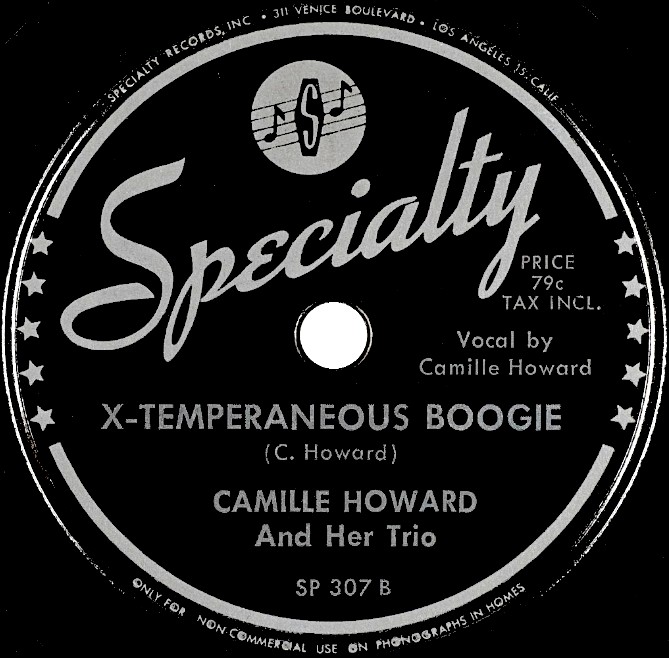
|
Above: Label images for Specialty SP 307 A/B, recorded on December 31, 1947 and released in 1948. Camille Howard is on her own for this record, without Roy Milton And His Solid Senders. But wonder if that's Roy Milton on drums and/or David Robinson on the bass fiddle?
CASH BOX, March 13, 1948:
Art Rupe of Specialty announces new releases set for Camille Howard, Roy Milton's pianist, who will solo via ivories and vocal with "You Donít Love Me".... Rupe has picked up options on Milton, Camille, Jimmy Liggins, the Pilgrim Travelers, and the Nelson Alexander Trio.... He plans publicity and promotion program for these artists covering three to five year contracts....CASH BOX, May 15, 1948:
....Specialtyís sales manager John Davis now in Cleveland and sends president Art Rupe glad tidings that Camille Howardís "You Donít Love Me" is a big thing there....CASH BOX, July 17, 1948:
Hereís a real cute story via Art Rupe, prexy of Specialty Records. Seems as if Camille Howardís cutting of "X-Temperanous Boogie" really was just that. With several sides scheduled for cutting just before the ban, Camille asked Art while she was seated at the piano, "What shall we cut for the last side?" And the Rupe man, the story goes, said, "Aw, just beat out some ex- temperanous boogie". And so it went.... The balance of the story can be seen in the sales records of that platter by Camille Howard....CASH BOX COVER, August 14, 1948: CAMILLE HOWARD
An answer to the juke box operatorsí prayer, Camille Howard has consistently batted a 100% average on records. Featured with the Roy Milton combination for the past five years, Camille has a slew of hits to her credit, among them, "Thrill Me", "Groovy Blues", "Mr. Fine", and "Camilleís Boogie". She became so popular that maestro decided to give the gal from Galveston a break and record on her own. Her first release was an immediate double-header hit, "X-Temperaneous Boogie" and the current click "You Donít Love Me", which is currently riding high on thousands of juke boxes throughout the nation. Art Rupe, president of Specialty Records has just signed Camille to a long term recording contract.

|
Cash Box Review (4/24/48):
CAMILLE HOWARD — Specialty 307.... You Don't Love Me/X-Temperaneous Boogie
Another hot and heavy platter for this diskery with ivory-thrush Camille Howard on top for the spotlight. The galís pipes spill in flavored tones on this top deck, "You Donít Love Me" with the metro weaving in slow mellow timing to blend to perfection. Slight quiver and catch in her tonsils makes you wanna listen all the more. Stuff is aimed at ops with race spots, with this deck beckoning coin play galore.Flip has Camille offering some pleasant boogie that rolls along in top notch metro bound to suit the likes of the jump set. Phono fans that go for some good piano rhythms surely wonít be disappointed with this piece. Both sides will fill your phono with coin.
The Billboard Review (5/29/48):
CAMILLE HOWARD TRIO — Specialty SP 307
X-Temperaneous Boogie(74) X for xciting altho there's little extempore here. Just good boogie performance with steady beat.
You Don't Love Me (85) Top notch chirping with a bit of Rose Murphy beat in the piano-bass rhythm support. Camille's a comer... song's good.
(NOTE: Ratings had a range of 0-100 with 70-79 as "good" and 80-89 as "excellent".)
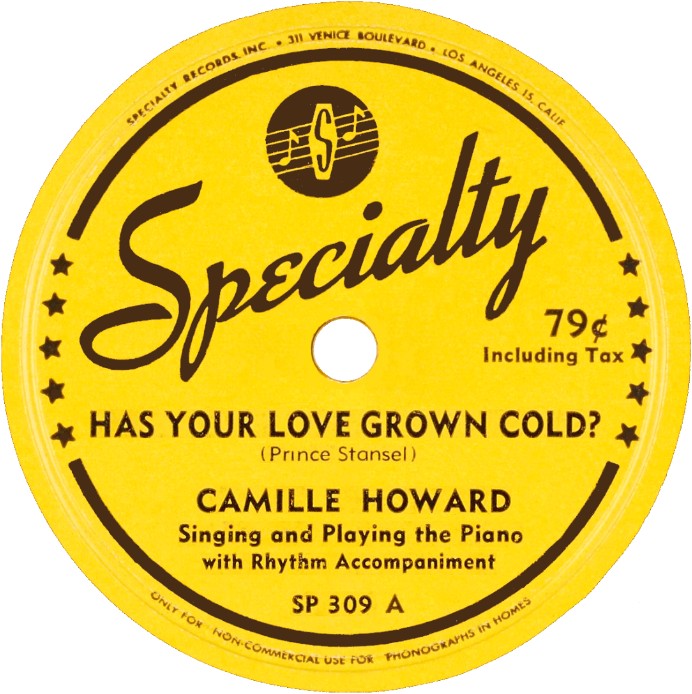
|
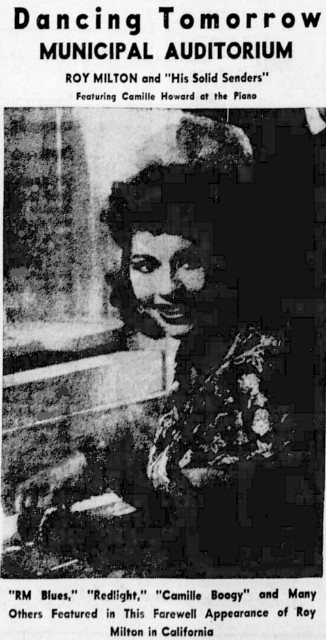
|
Above Left: Label image for Specialty SP 309 A, recorded on December 31, 1947 and released in 1948. Again, Camille is on her own here. Again, might that be Roy Milton on drums and/or David Robinson on bass fiddle? Above Right: SAN BERNARDINO COUNTY SUN, August 3, 1947.
Cash Box Review (9/25/48):
CAMILLE HOWARD — Specialty 309.... Has Your Love Grown Cold?
Following on the heels of her nothing short than sensational "You Donít Love Me", chirp Camille Howard keeps riding high with this pair sure to win wide favor from music ops [juke box operators]. The galís heavy pipes purr the soothing wordage to "Has Your Love Grown Cold" in knockout style and manner. Wax will literally be gobbled up once it makes the rounds. Music is haunting and is suitable for the dance crowd with its shuffle rhythm really lending itself to the song.LISTEN (Windows Media Player): [Audio restoration by Dave Saviet.]
1. "Rainy Day Blues" - Jump Jackson And His Band (Vocal By Bob Carter) - Specialty SP 506 A - 1946.
2. "Red Light" - Jump Jackson And His Band (Vocal By Bob Carter) - Specialty SP 506 B - 1946.
3. "Rock That Voot" - Nelson Alexander Trio (Vocal By Nelson Alexander And Ensemble) - Specialty SP 308 B - 1948.
4. "You Don't Love Me" - Camille Howard And Her Trio - Specialty SP 307 A - 1948.
5. "X-Temperaneous Boogie" - Camille Howard And Her Trio - Specialty SP 307 B - 1948.
6. "Has Your Love Grown Cold?" - Camille Howard - Specialty SP 309 A - 1948.ALL SIX SONGS played in sequence.

|

|
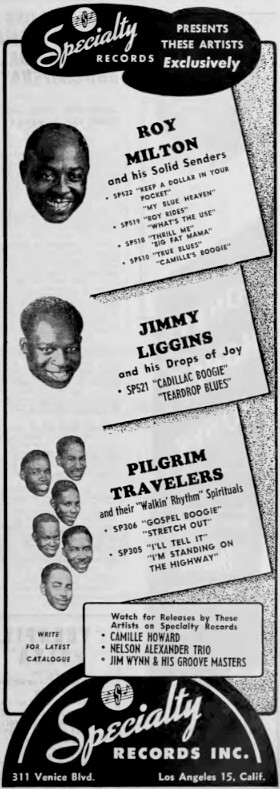
|
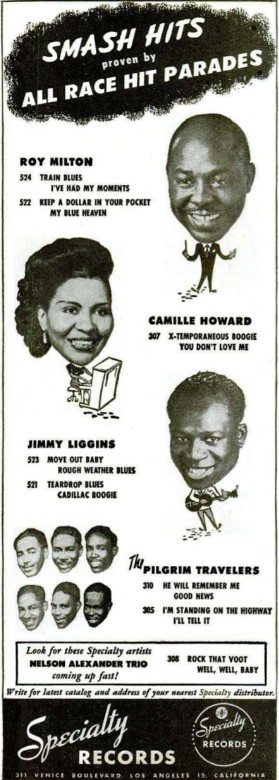
|
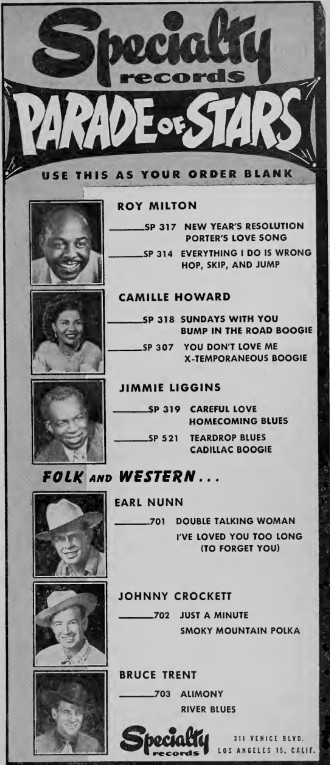
|
Above Left: CASH BOX, June 14, 1947. Above Middle Left: CASH BOX, November 22, 1947.
Above Middle: CASH BOX, January 31, 1948.
Above Middle Right: CASH BOX, June 19, 1948.
Above Right: CASH BOX, January 29, 1949.
The four advertisements above left show the original style Specialty label. The far right advertisement lists records that were issued on the original label, but the new style "Specialty" logo is shown. In Part Three of this article, we will begin the more familiar style black and white label with the new style "Specialty" name in yellow.
Jimmy Liggins will be included in a later part of this article. As suggested by the above "Pilgrim Travelers" sections, Specialty Records did include comprehensive coverage of various gospel groups, including the highly regarded Pilgrim Travelers and Original Gospel Harmonettes. Specialty's gospel groups will be covered in the final part of this article. Specialty also delved into country and western records (700 series). See example label at right.
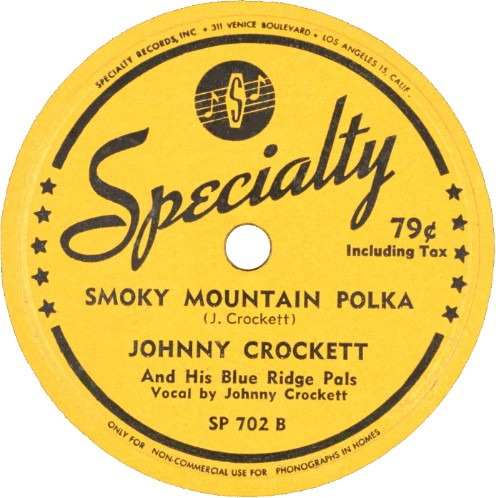
EXTRA JUMP JACKSON:
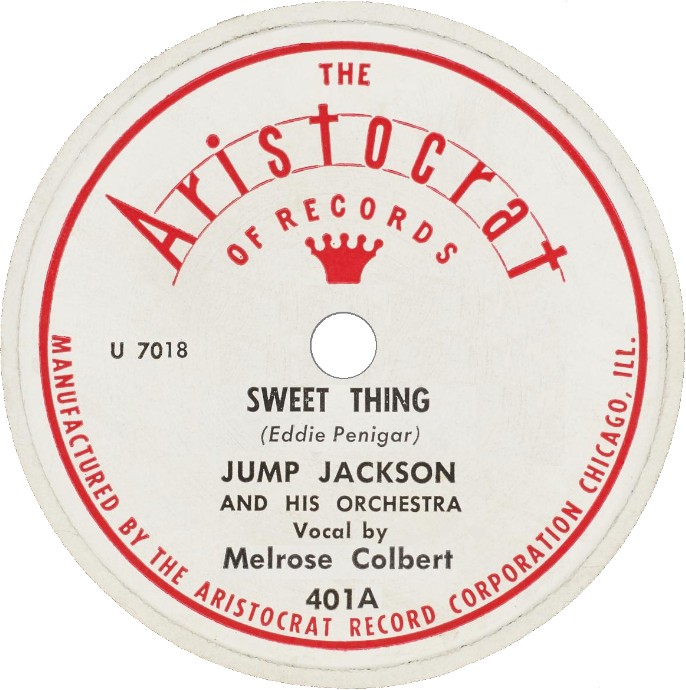
|
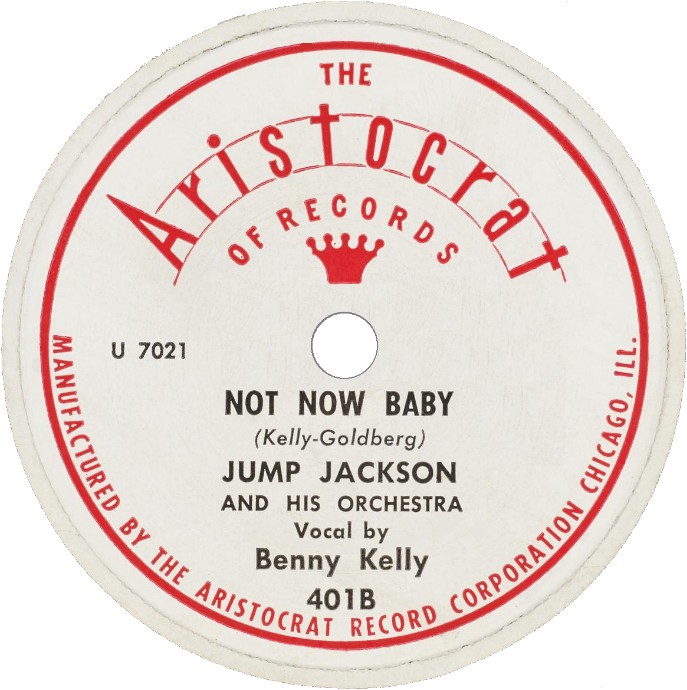
|
Above: Label images for both sides of Aristocrat 401A/B, released in 1947. Armand "Jump" Jackson was an orchestra leader, singer, and drummer.
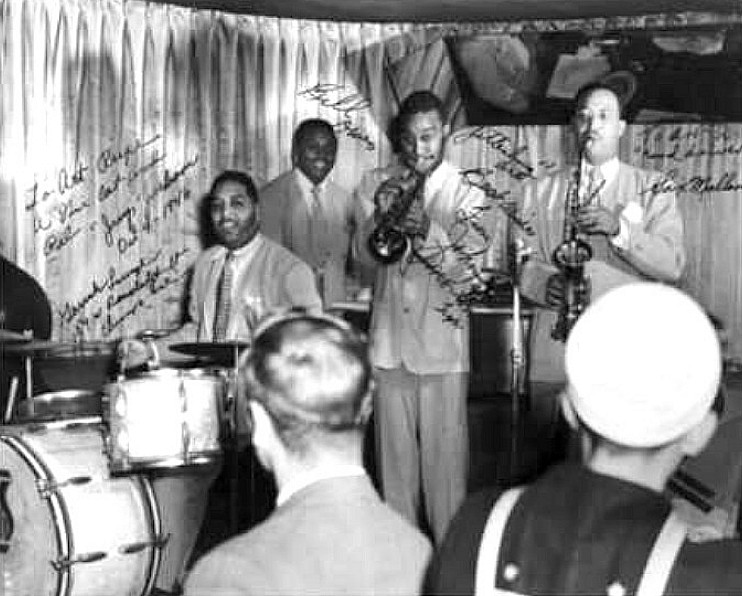
|
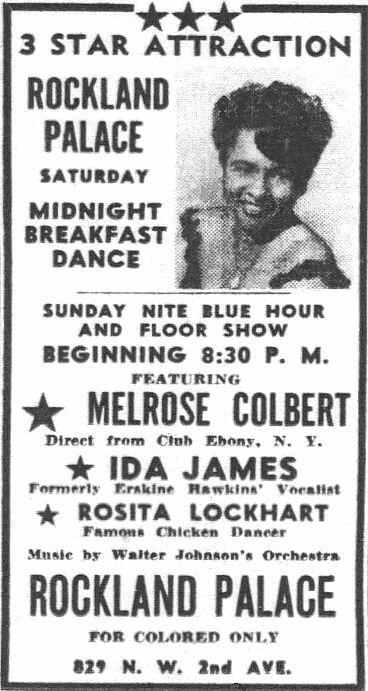
|
Above Left: Photo from 1946 of Jump Jackson and his band. (L-R) Jump Jackson (drums), Bill Owens (piano), Johnny Morton (trumpet), and Sax Mallard (saxophone). Note the inscription at upper left... "To Art Rupe A true[?] cat and pal 'Jump' Jackson". Above Right: MIAMI NEWS, June 27, 1948.... With picture of Melrose Colbert.
Click HERE for an article about Melrose colbert by Marv Goldberg. (Will open in a separate window)
CASH BOX, August 25, 1947:
....Evelyn Aron of Chicagoís Aristocrat Records writes to advise the firm just signed Jump Jackson and his band. Says Evie, "A race outfit that really jumps, and cries the blues". Aristocrat also signed Melrose Colbert, sepia torch....The Cash Box Review (9/29/47):
JUMP JACKSON ORCH. — Aristocrat 401.... Sweet Thing/Not Now Baby
Pair of hot items that ops with race spots should look into are these by the Jump Jackson ork titled "Sweet Thing" and "Not Now Baby". Featuring vocalist Melrose Colbert on the top deck, the chirpís rendition adds loads to the maestroís wonderful instrumental accompaniment. Ditty spins in the slow mood, with the canaryís haunting voice eating right into you. Pitch revolves around the headline, with the piping getting all the glory.On the flip with some stuff by Benny Kelly, the mood changes to real low down blues, while a boogie beat tickles the ivories throughout. Bennyís heavy and pronounced voice shapes the future for this deck brightly as an attractive pancake for your machines.
LISTEN (Windows Media Player): [Audio restoration by Dave Saviet.]
1. "Sweet Thing" - Jump Jackson Orchestra (Vocal By Melrose Colbert) - Aristocrat 401A - 1947.
2. "Not Now Baby" - Jump Jackson Orchestra (Vocal By Benny Kelly) - Aristocrat 401B - 1947.BOTH SONGS played in sequence.
EXTRA CAMILLE HOWARD:
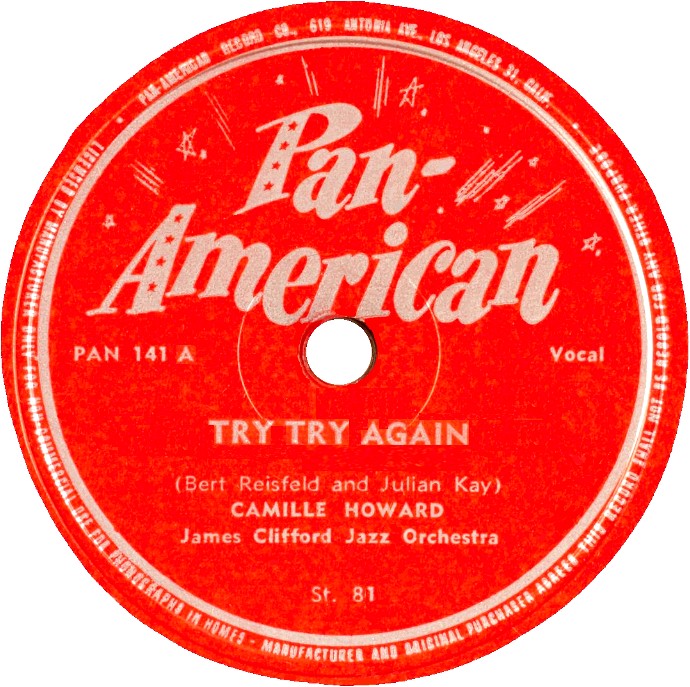
|
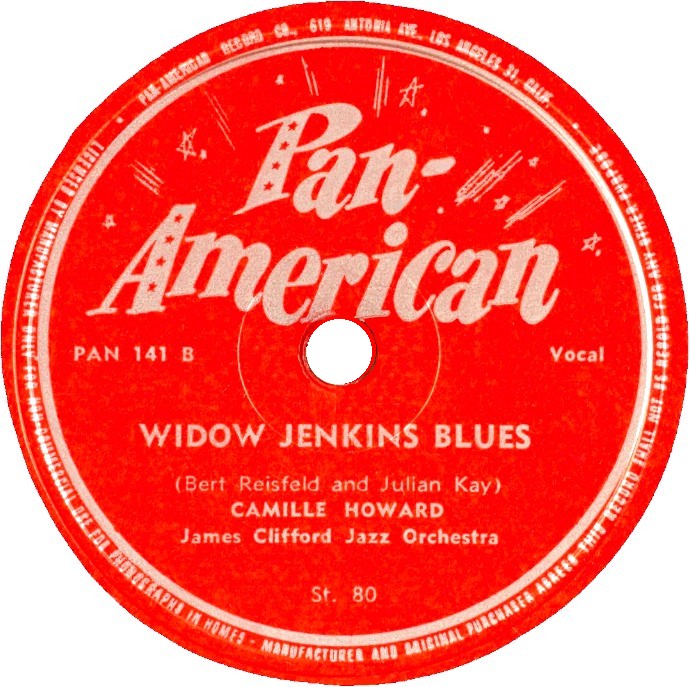
|

|
Above Left And Middle: Label images for both sides of Pan-American PAN 141 A/B, released in 1946. Above Right: CALIFORNIA EAGLE, July 22, 1948.
NOTE: Camille Howard is in this cropped picture. The accompanying text tells us that the proceeds from the Roy Milton show at the Elks Hall on Sunday evening were donated to send kids to summer camp.
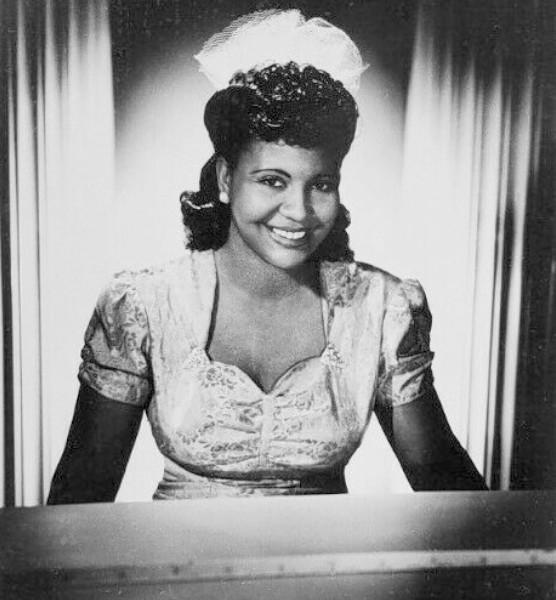
|
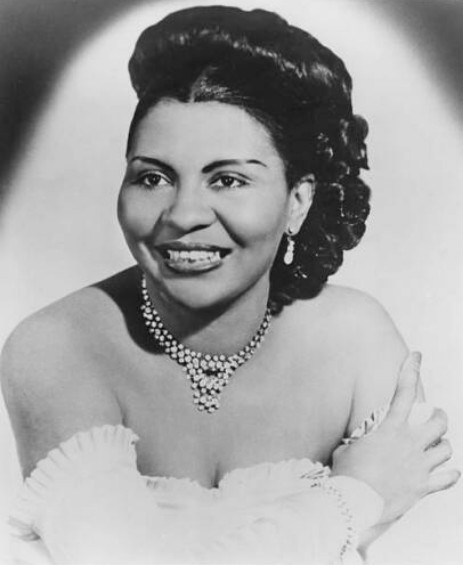
|

|
Above Left and Middle: Two photos of Camille Howard, pianist, vocalist, and composer. Above Right: THE BILLBOARD, September 1, 1945.
LISTEN (Windows Media Player): [Audio restoration by Dave Saviet.]
1. "Try Try Again" - Camille Howard - Pan-American PAN 141 A - 1946.
2. "Widow Jenkins Blues" - Camille Howard - Pan-American PAN 141 B - 1946.BOTH SONGS played in sequence.
EXTRA NELSON ALEXANDER:
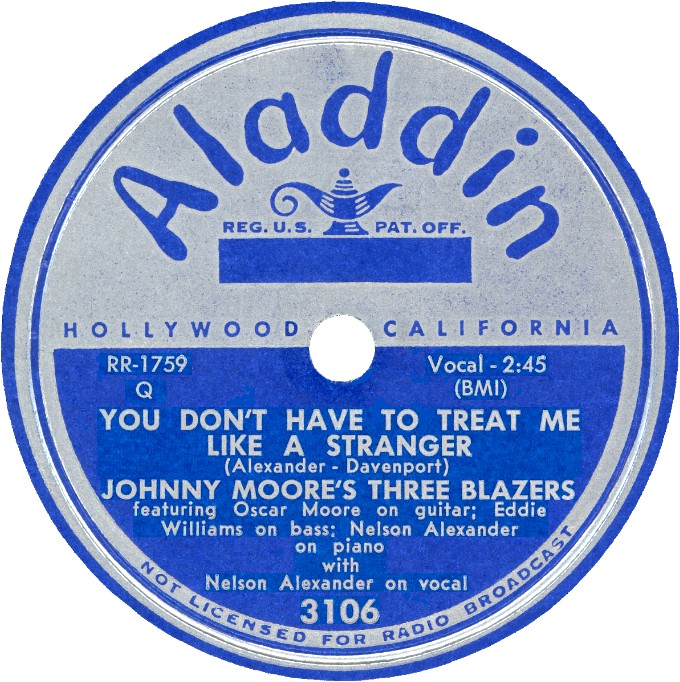
|
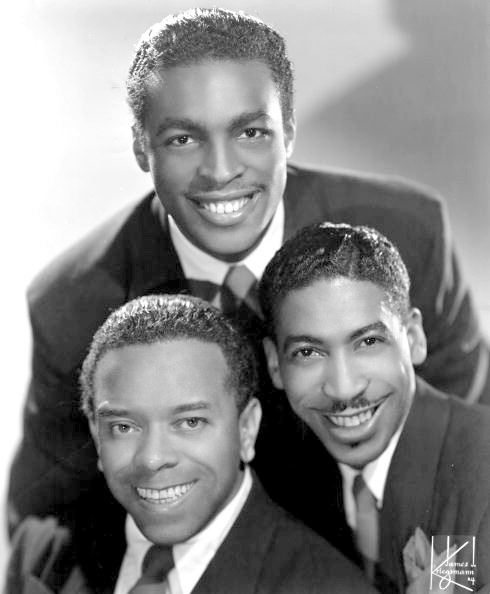
|
Above Left: Label image for Aladdin 3106, recorded on October 3, 1951 and released in 1951. Nelson Alexander plays piano, sings the vocal, and is co-composer on this side. Above Right: Johnny Moore's Three Blazers (Top) Charles Brown (piano), (Bottom L-R) Johnny Moore (guitar), and Eddie Williams (bass fiddle). On the above record, Nelson Alexander replaces Charles Brown. [NOTE: The above right photo provided by Hans-Joachim Krohberger.]
LISTEN (Windows Media Player): [Audio restoration by Dave Saviet.]
"You Don't Have To Treat Me Like A Stranger" - Johnny Moore's Three Blazers (Vocal By Nelson Alexander) - Aladdin 3106 - 1951.
SIDEBAR — "RED LIGHT": The song was composed by Red Callender and Leonard Enois, who was the guitar player in Red Callender's Trio. Red's Trio released the song on the Black & White label in June 1946. "Red Light" was also released by Roy Milton And His Solid Senders on Roy Milton 102 and by Jump Jackson on Specialty SP 506 B, both in 1946. Roy's version is included in Part One of this article. Jump's version is further above on this page.
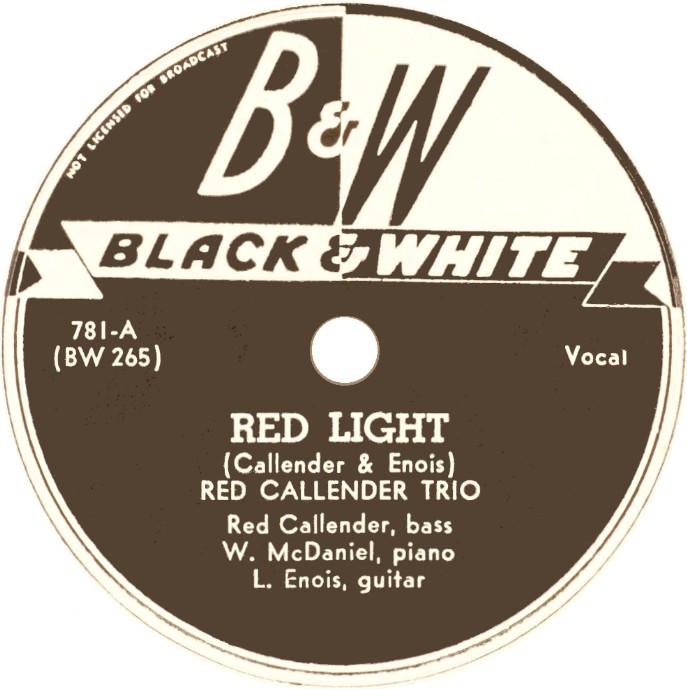
|
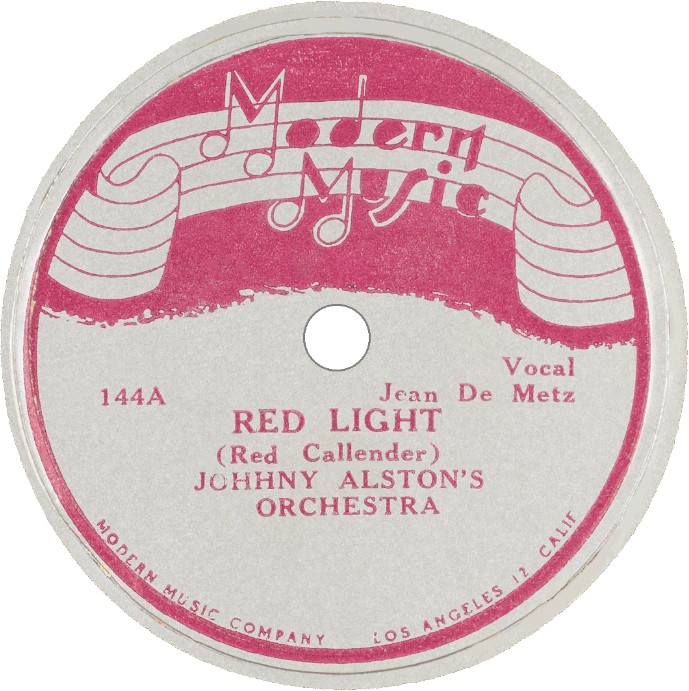
|
Above Left: Label image for Black & White 781-A, released in June 1946. The vocal is by the Trio. Above Right: Label image for Modern Music 144A, released in 1946. The vocal is by Johnny Alston, Jeanne De Metz, and the orchestra ensemble.
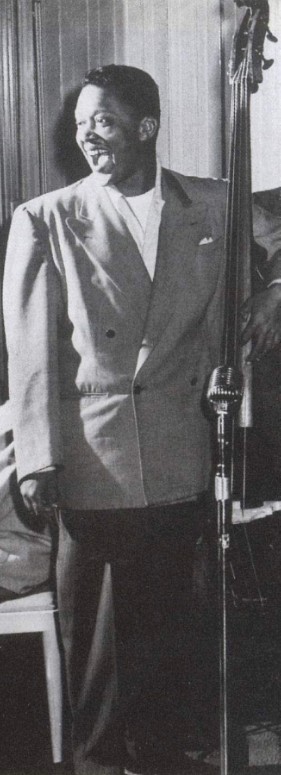
|
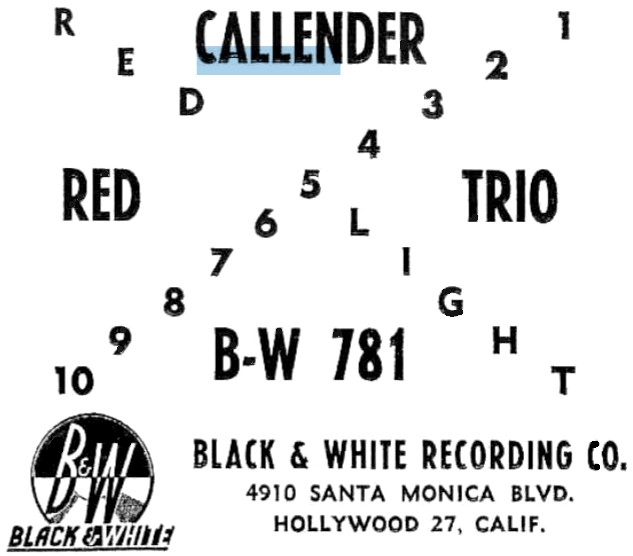
At Left: Photo of Red Callender when with his short-lived 1948 band. Above: THE BILLBOARD, June 8, 1946. |
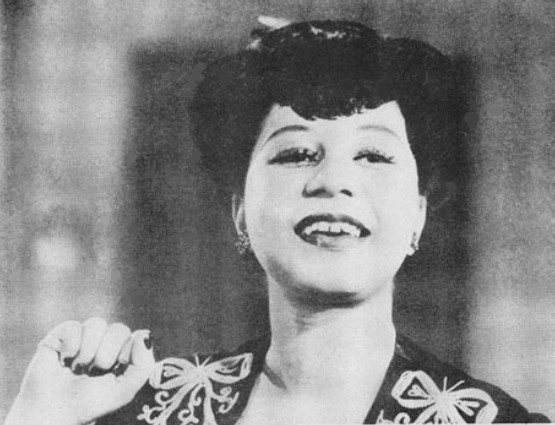
|
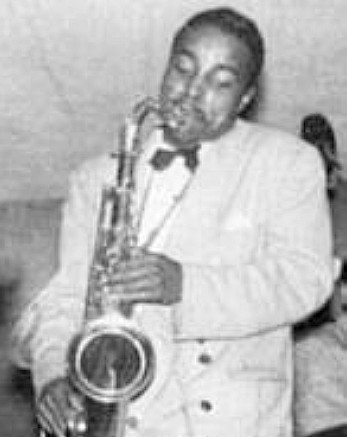
|
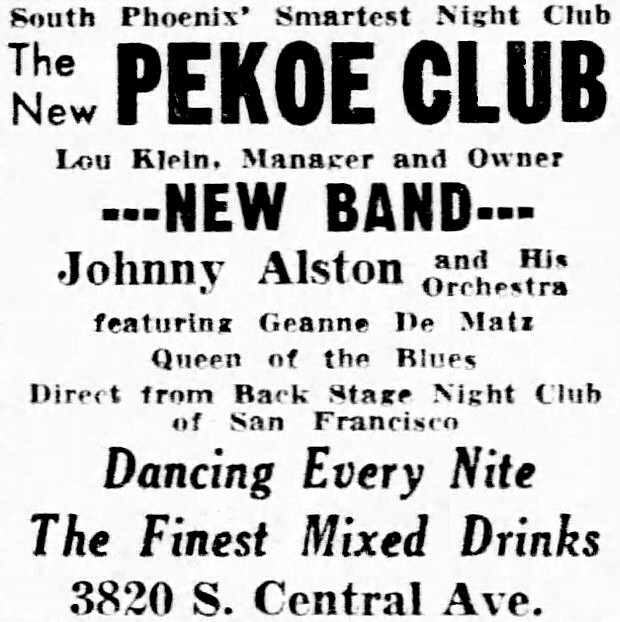
|
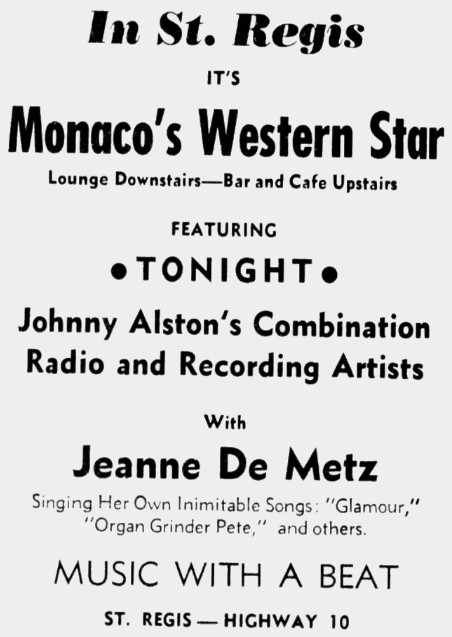
|
Above Left: ARIZONA REPUBLIC, June 13, 1945. Jeanne De Metz is "Queen of the Blues" .... but in Part One, Marion Abernathy was declared that same title. Above Right: MISSOULIAN, November 27, 1948.
NOTE: There you have it.... Three different spellings of her name, on the record label and the two clippings above.
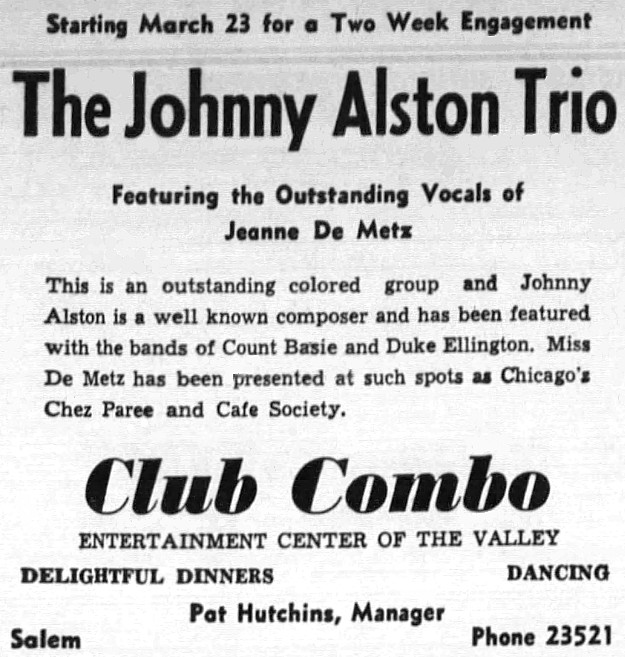
|
Above: ALBANY DEMOCRAT, March 22, 1949. Yes, this is the correct spelling of her name. As you can see from the dates on these last three clippings, Johnny Alston and Jeanne De Metz were together for several years.
The Billboard Review (6/5/46):
RED CALLENDER TRIO — Black & White 781.... Red LightThe Red Callender Trio on the Black & White label consisted of Red Callender (bass fiddle), Willard McDaniel (piano), and Leonard "Lucky" Enois (guitar).
If this threesome (piano, guitar and bass) would stick to their instruments instead of taking on vocal burdens, there would be more for the ears. Little that comes thru from beneath the trio's race shouting saves sides from being total wax-wasters. Brisk beat in "Red Light" helps out, but lyrics are trite. Words are even weaker on the backside, with voicers adding to tune's troubles by badly missing the starting beat. "Red Light" may stop some, atho race phono fans have better from which to choose. (NOTE: The Billboard did hand out bad reviews once in a while.)Johnny Alston's Orchestra on the Modern Music label consisted of Johnny Alston (tenor sax), Jack Lake (tenor sax-clarinet), Jack Wilfon (trumpet), King Fleming (piano), Addison Farmer (bass fiddle), Al Wichard (drums), and Charles Cook (guitar).
LISTEN (Windows Media Player): [Audio restoration by Dave Saviet.]
1. "Red Light" - Red Callender Trio (Vocal by The Trio) - Black & White 781-A - 1946.
2. "Red Light" - Johnny Alston's Orchestra (Vocal By Johnny Alston, Jean De Metz, And Ensemble) - Modern Music 144A - 1946.BOTH SONGS played in sequence.
SPECIALTY RECORDS - PART ONE FEATURES ATLAS RECORDS, JUKE BOX RECORDS, ROY MILTON RECORDS, MILTONE RECORDS, THE SEPIA TONES, MARION ABERNATHY, BUDDY BANKS, ROY MILTON AND HIS SOLID SENDERS, JIMMIE GRISSOM, EFFIE SMITH, FRANKIE AND HER BOYS, AND MP4 VIDEO OF ROY MILTON/JUNE RICHMOND. SPECIALTY RECORDS - PART THREE FEATURES EARLY SPECIALTY RECORDS (CONT'D), ROY MILTON AND HIS SOLID SENDERS, JOE LUTCHER, CAMILLE HOWARD, BUDDY BANKS AND HIS BUDDIES, BABY DAVIS, FLUFFY HUNTER, JOE LIGGINS AND HIS HONEYDRIPPERS, LIONEL HAMPTON AND THE HAMPTONES, "THE HONEYDRIPPER", FIDELITY RECORDS, THE FOUR FLAMES, BUMBLE BEE SLIM, AND THE VICTORIANS.
SPECIALTY RECORDS - PART FOUR FEATURES "THE HUCKLEBUCK" (FIVE VERSIONS), ROY MILTON (1952), "OH BABE!" (FIVE VERSIONS), KING PERRY, LLOYD PRICE, MERCY DEE, AND KENZIE MOORE (JOE DYSON'S BAND).
SPECIALTY RECORDS - PART FIVE FEATURES FLOYD DIXON, JIMMY LIGGINS, EARL KING, PERCY MAYFIELD, THE MAYTONES, WILLIE JOHNSON, GUITAR SLIM, ROY MILTON (1953-1955), CAMILLE HOWARD, TONY ALLEN, THE CHIMES, MARVIN AND JOHNNY, JESSE BELVIN, AND THREE DOTS AND A DASH.
SPECIALTY RECORDS - PART SIX FEATURES VERNON GREEN AND THE PHANTOMS, LITTLE RICHARD, WYNONA CARR, LARRY WILLIAMS, DON AND DEWEY, SAM COOKE, THE SOUTHERN HARMONIZERS, THE SOUL STIRRERS, SISTER WYNONA CARR, THE MEDITATION SINGERS, THE ORIGINAL GOSPEL HARMONETTES, THE PILGRIM TRAVELERS, AND ALEX BRADFORD AND THE BRADFORD SPECIALS.
Listen to all of this article's audio selections using Windows Media Player:
[Audio restoration by Dave Saviet.]
|
1. "Boogie Woogie Time Down South" - Lillette And Her Escorts (Vocal By Lillette Thomas And Ensemble) - Sterling SR 108 - 1946.
2. "I Need It Bad" - Buddy Banks Sextette (Vocal By Ensemble) - Sterling SR102A - 1946. 3. "Can't Help Lovin' Dat Man" - Dolores Brown And The Auditones - Sterling 3002 A - 1947. 4. "Always" - Ace Harris (Vocal By Ace Harris And Ensemble) - Sterling 3008 A - 1947. 5. "My Blue Heaven" - Roy Milton Solid Senders (Vocal By Roy Milton And His Solid Senders) - Special CH 1001 A. 6. "Run Roy Run" - Roy Milton Solid Senders (Instrumental) - Special CH 1001 B. 7. "Mr. Fine" - Roy Milton And His Solid Senders (Vocal By Camille Howard) - Specialty 515 A - 1947. 8. "Rainy Day Confession Blues" - Roy Milton And His Solid Senders (Vocal By Camille Howard) - Specialty 515 B - 1947. 9. "When I Grow Too Old To Dream" - Roy Milton And His Solid Senders (Vocal By Roy Milton And Ensemble) - Specialty 517 A - 1947. 10. "Pack Your Sack Jack" - Roy Milton And His Solid Senders (Vocal By Camille Howard) - Specialty SP 517 B - 1947. 11. "Big Fat Mama" Roy Milton And His Solid Senders (Vocal By Roy Milton And Ensemble) - Specialty SP 518 A - 1947. 12. "New Year's Resolution" - Roy Milton And His Solid Senders - Specialty SP 317 A - 1948. 13. "Porter's Love Song" - Roy Milton And His Solid Senders - Specialty SP 317 B - 1948. 14. "Burma Road Blues (Part 1)" - Roy Milton's Sextet - Hamp-Tone 104 - 1946. 15. "Burma Road Blues (Part 2)" - Roy Milton's Sextet - Hamp-Tone 104 - 1946. 16. "I'll Always Be In Love With You" - Roy Milton (And His Band) - Roy Milton 104 - 1946. 17. "Sunny Side Of The Street" - Roy Milton (And His Band) - Roy Milton 104 - 1946. 18. "When I Grow Too Old To Dream" - Al Cooper's Savoy Sultans (Vocal By Evelyn White) - Decca 4206 B - 1939. 19. "When I Grow Too Old To Dream" - The Cats And The Fiddle - Bluebird B-8443-B - 1939. 20. "When I Grow Too Old To" The Tempo Jazz Men (Vocal By The Three Angels) - Dial D-1004B - 1946. 21. "When I Grow Too Old To Dream" - The Charioteers - Columbia 38187 - 1947. 22. "Rainy Day Blues" - Jump Jackson And His Band (Vocal By Bob Carter) - Specialty SP 506 A - 1946. 23. "Red Light" - Jump Jackson And His Band (Vocal By Bob Carter) - Specialty SP 506 B - 1946. 24. "Rock That Voot" - Nelson Alexander Trio (Vocal By Nelson Alexander And Ensemble) - Specialty SP 308 B - 1948. 25. "You Don't Love Me" - Camille Howard And Her Trio - Specialty SP 307 A - 1948. 26. "X-Temperaneous Boogie" - Camille Howard And Her Trio - Specialty SP 307 B - 1948. 27. "Has Your Love Grown Cold?" - Camille Howard - Specialty SP 309 A - 1948. 28. "Sweet Thing" - Jump Jackson Orchestra (Vocal By Melrose Colbert) - Aristocrat 401A - 1947. 29. "Not Now Baby" - Jump Jackson Orchestra (Vocal By Benny Kelly) - Aristocrat 401B - 1947. 30. "Try Try Again" - Camille Howard - Pan-American PAN 141 A - 1946. 31. "Widow Jenkins Blues" - Camille Howard - Pan-American PAN 141 B - 1946. 32. "You Don't Have To Treat Me Like A Stranger" - Johnny Moore's Three Blazers (Vocal By Nelson Alexander) - Aladdin 3106 - 1951. 33. "Red Light" - Red Callender Trio (Vocal by The Trio) - Black & White 781-A - 1946. 34. "Red Light" - Johnny Alston's Orchestra (Vocal By Johnny Alston, Jean De Metz, And Ensemble) - Modern Music 144A - 1946. ALL THIRTY-FOUR ABOVE SONGS played in sequence. ALL NINETEEN ABOVE STERLING AND SPECIALTY SONGS played in sequence. |
PREVIOUS ARTICLES/RECORDS OF THE WEEK!
Last Update: January 27, 2022
E-mail Me: